Entrepreneurship and Small Business Management
VerifiedAdded on 2023/01/19
|20
|5554
|45
AI Summary
This document discusses the types of entrepreneurial ventures, their typologies, and the differences and common aspects between them. It also explores the relevant data on how micro and small businesses impact the economy and the importance of small and start-ups in the social economy.
Contribute Materials
Your contribution can guide someone’s learning journey. Share your
documents today.

Entrepreneurship and Small
Business Management
Business Management
Secure Best Marks with AI Grader
Need help grading? Try our AI Grader for instant feedback on your assignments.
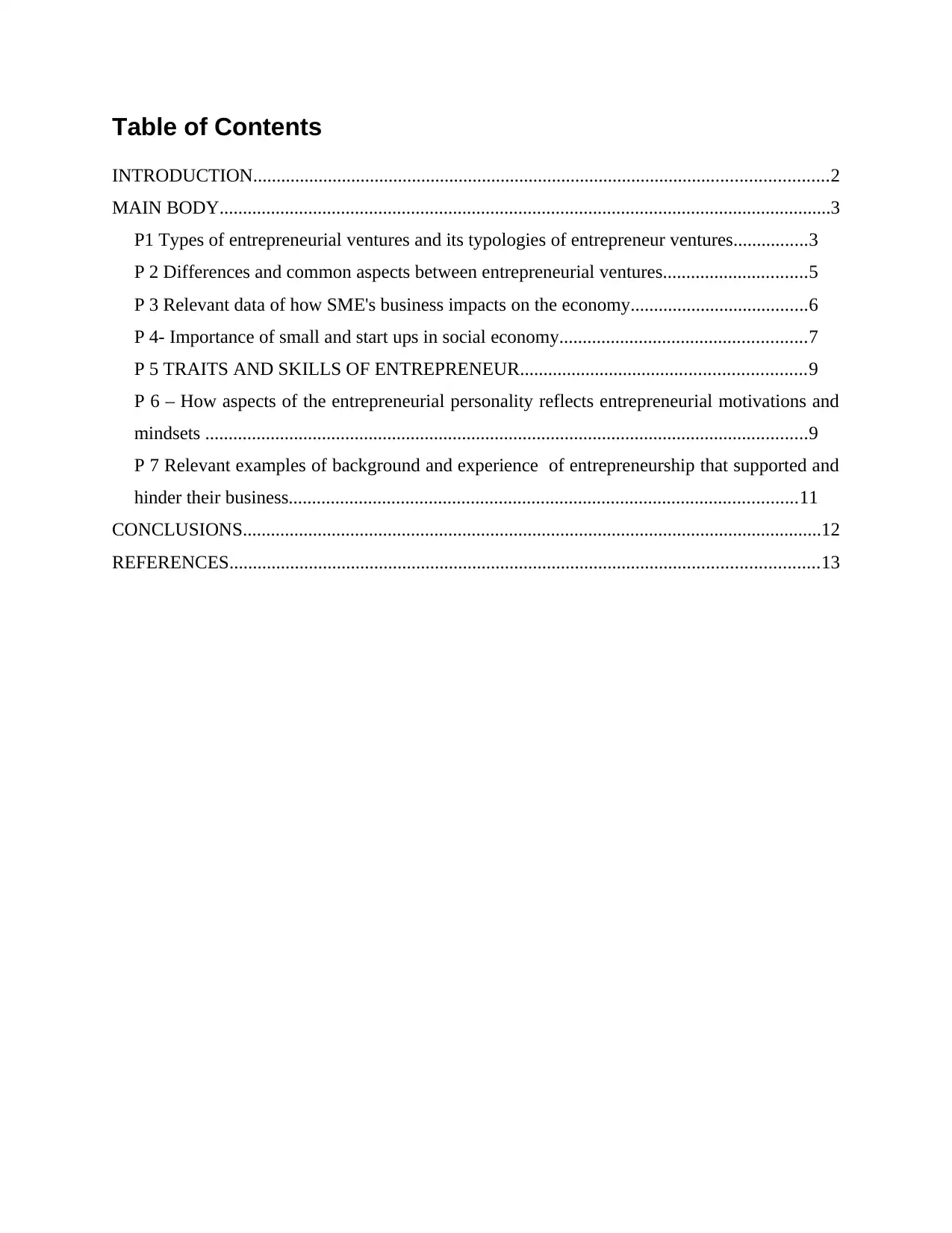
Table of Contents
INTRODUCTION...........................................................................................................................2
MAIN BODY...................................................................................................................................3
P1 Types of entrepreneurial ventures and its typologies of entrepreneur ventures................3
P 2 Differences and common aspects between entrepreneurial ventures...............................5
P 3 Relevant data of how SME's business impacts on the economy......................................6
P 4- Importance of small and start ups in social economy.....................................................7
P 5 TRAITS AND SKILLS OF ENTREPRENEUR.............................................................9
P 6 – How aspects of the entrepreneurial personality reflects entrepreneurial motivations and
mindsets .................................................................................................................................9
P 7 Relevant examples of background and experience of entrepreneurship that supported and
hinder their business.............................................................................................................11
CONCLUSIONS............................................................................................................................12
REFERENCES..............................................................................................................................13
INTRODUCTION...........................................................................................................................2
MAIN BODY...................................................................................................................................3
P1 Types of entrepreneurial ventures and its typologies of entrepreneur ventures................3
P 2 Differences and common aspects between entrepreneurial ventures...............................5
P 3 Relevant data of how SME's business impacts on the economy......................................6
P 4- Importance of small and start ups in social economy.....................................................7
P 5 TRAITS AND SKILLS OF ENTREPRENEUR.............................................................9
P 6 – How aspects of the entrepreneurial personality reflects entrepreneurial motivations and
mindsets .................................................................................................................................9
P 7 Relevant examples of background and experience of entrepreneurship that supported and
hinder their business.............................................................................................................11
CONCLUSIONS............................................................................................................................12
REFERENCES..............................................................................................................................13
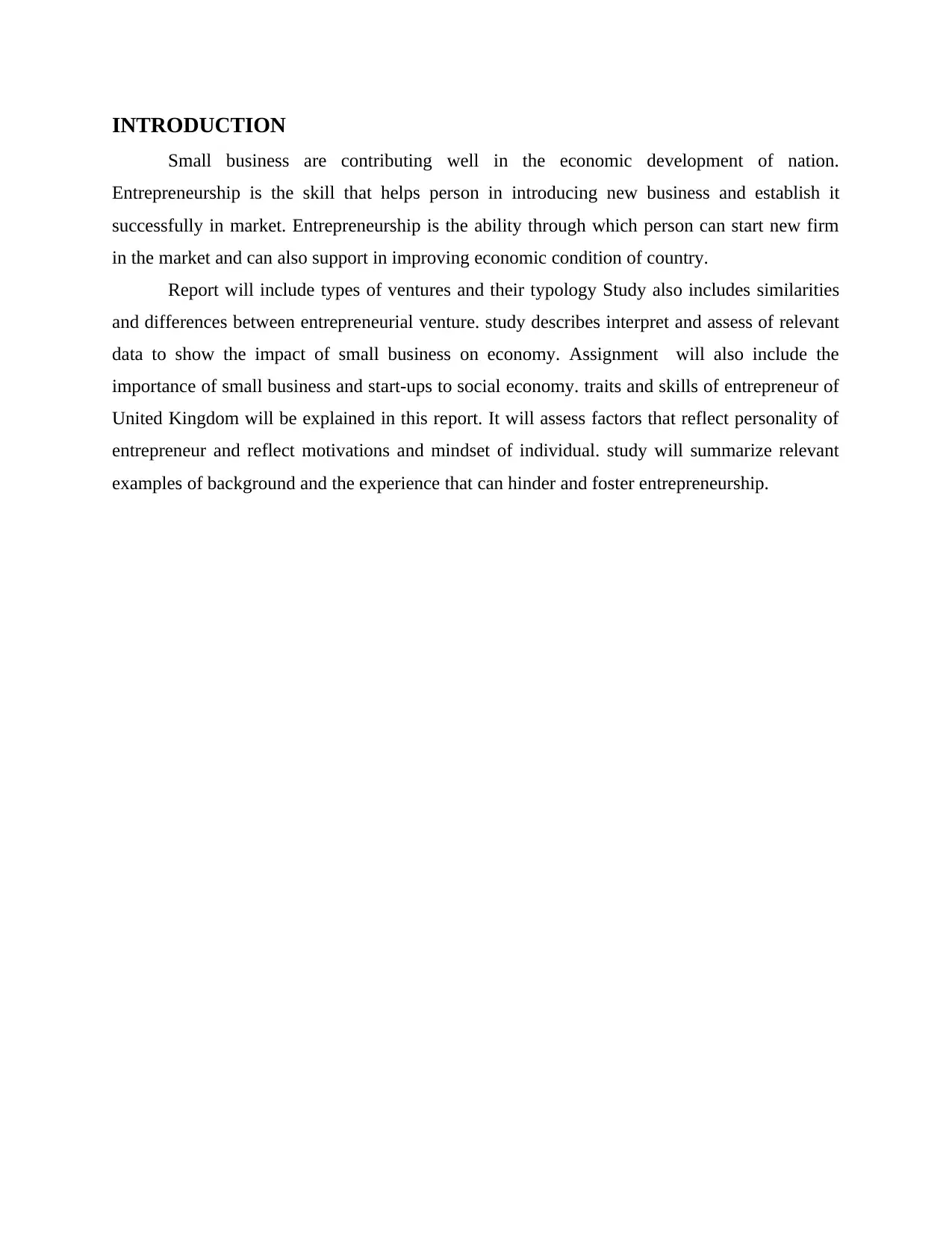
INTRODUCTION
Small business are contributing well in the economic development of nation.
Entrepreneurship is the skill that helps person in introducing new business and establish it
successfully in market. Entrepreneurship is the ability through which person can start new firm
in the market and can also support in improving economic condition of country.
Report will include types of ventures and their typology Study also includes similarities
and differences between entrepreneurial venture. study describes interpret and assess of relevant
data to show the impact of small business on economy. Assignment will also include the
importance of small business and start-ups to social economy. traits and skills of entrepreneur of
United Kingdom will be explained in this report. It will assess factors that reflect personality of
entrepreneur and reflect motivations and mindset of individual. study will summarize relevant
examples of background and the experience that can hinder and foster entrepreneurship.
Small business are contributing well in the economic development of nation.
Entrepreneurship is the skill that helps person in introducing new business and establish it
successfully in market. Entrepreneurship is the ability through which person can start new firm
in the market and can also support in improving economic condition of country.
Report will include types of ventures and their typology Study also includes similarities
and differences between entrepreneurial venture. study describes interpret and assess of relevant
data to show the impact of small business on economy. Assignment will also include the
importance of small business and start-ups to social economy. traits and skills of entrepreneur of
United Kingdom will be explained in this report. It will assess factors that reflect personality of
entrepreneur and reflect motivations and mindset of individual. study will summarize relevant
examples of background and the experience that can hinder and foster entrepreneurship.
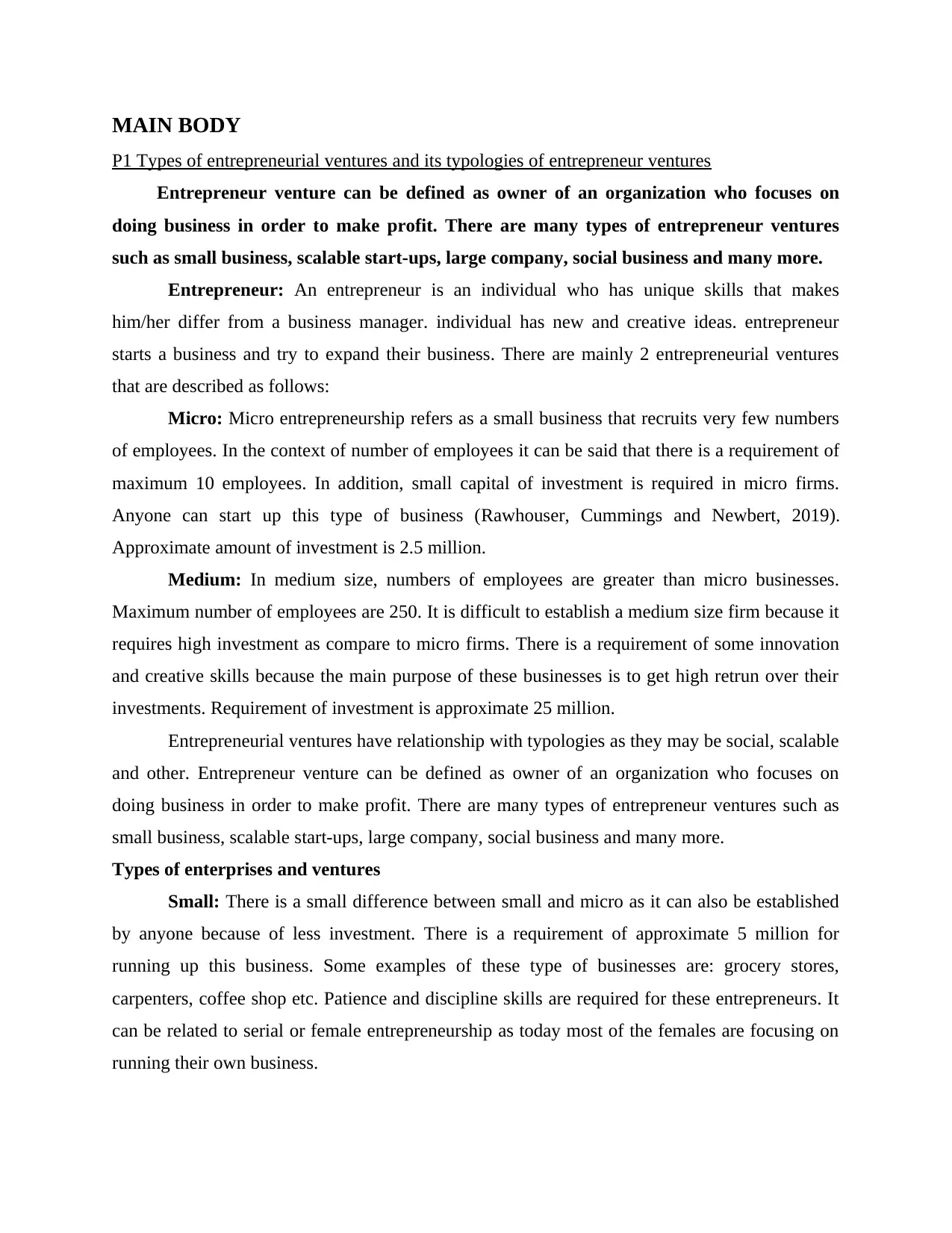
MAIN BODY
P1 Types of entrepreneurial ventures and its typologies of entrepreneur ventures
Entrepreneur venture can be defined as owner of an organization who focuses on
doing business in order to make profit. There are many types of entrepreneur ventures
such as small business, scalable start-ups, large company, social business and many more.
Entrepreneur: An entrepreneur is an individual who has unique skills that makes
him/her differ from a business manager. individual has new and creative ideas. entrepreneur
starts a business and try to expand their business. There are mainly 2 entrepreneurial ventures
that are described as follows:
Micro: Micro entrepreneurship refers as a small business that recruits very few numbers
of employees. In the context of number of employees it can be said that there is a requirement of
maximum 10 employees. In addition, small capital of investment is required in micro firms.
Anyone can start up this type of business (Rawhouser, Cummings and Newbert, 2019).
Approximate amount of investment is 2.5 million.
Medium: In medium size, numbers of employees are greater than micro businesses.
Maximum number of employees are 250. It is difficult to establish a medium size firm because it
requires high investment as compare to micro firms. There is a requirement of some innovation
and creative skills because the main purpose of these businesses is to get high retrun over their
investments. Requirement of investment is approximate 25 million.
Entrepreneurial ventures have relationship with typologies as they may be social, scalable
and other. Entrepreneur venture can be defined as owner of an organization who focuses on
doing business in order to make profit. There are many types of entrepreneur ventures such as
small business, scalable start-ups, large company, social business and many more.
Types of enterprises and ventures
Small: There is a small difference between small and micro as it can also be established
by anyone because of less investment. There is a requirement of approximate 5 million for
running up this business. Some examples of these type of businesses are: grocery stores,
carpenters, coffee shop etc. Patience and discipline skills are required for these entrepreneurs. It
can be related to serial or female entrepreneurship as today most of the females are focusing on
running their own business.
P1 Types of entrepreneurial ventures and its typologies of entrepreneur ventures
Entrepreneur venture can be defined as owner of an organization who focuses on
doing business in order to make profit. There are many types of entrepreneur ventures
such as small business, scalable start-ups, large company, social business and many more.
Entrepreneur: An entrepreneur is an individual who has unique skills that makes
him/her differ from a business manager. individual has new and creative ideas. entrepreneur
starts a business and try to expand their business. There are mainly 2 entrepreneurial ventures
that are described as follows:
Micro: Micro entrepreneurship refers as a small business that recruits very few numbers
of employees. In the context of number of employees it can be said that there is a requirement of
maximum 10 employees. In addition, small capital of investment is required in micro firms.
Anyone can start up this type of business (Rawhouser, Cummings and Newbert, 2019).
Approximate amount of investment is 2.5 million.
Medium: In medium size, numbers of employees are greater than micro businesses.
Maximum number of employees are 250. It is difficult to establish a medium size firm because it
requires high investment as compare to micro firms. There is a requirement of some innovation
and creative skills because the main purpose of these businesses is to get high retrun over their
investments. Requirement of investment is approximate 25 million.
Entrepreneurial ventures have relationship with typologies as they may be social, scalable
and other. Entrepreneur venture can be defined as owner of an organization who focuses on
doing business in order to make profit. There are many types of entrepreneur ventures such as
small business, scalable start-ups, large company, social business and many more.
Types of enterprises and ventures
Small: There is a small difference between small and micro as it can also be established
by anyone because of less investment. There is a requirement of approximate 5 million for
running up this business. Some examples of these type of businesses are: grocery stores,
carpenters, coffee shop etc. Patience and discipline skills are required for these entrepreneurs. It
can be related to serial or female entrepreneurship as today most of the females are focusing on
running their own business.
Secure Best Marks with AI Grader
Need help grading? Try our AI Grader for instant feedback on your assignments.
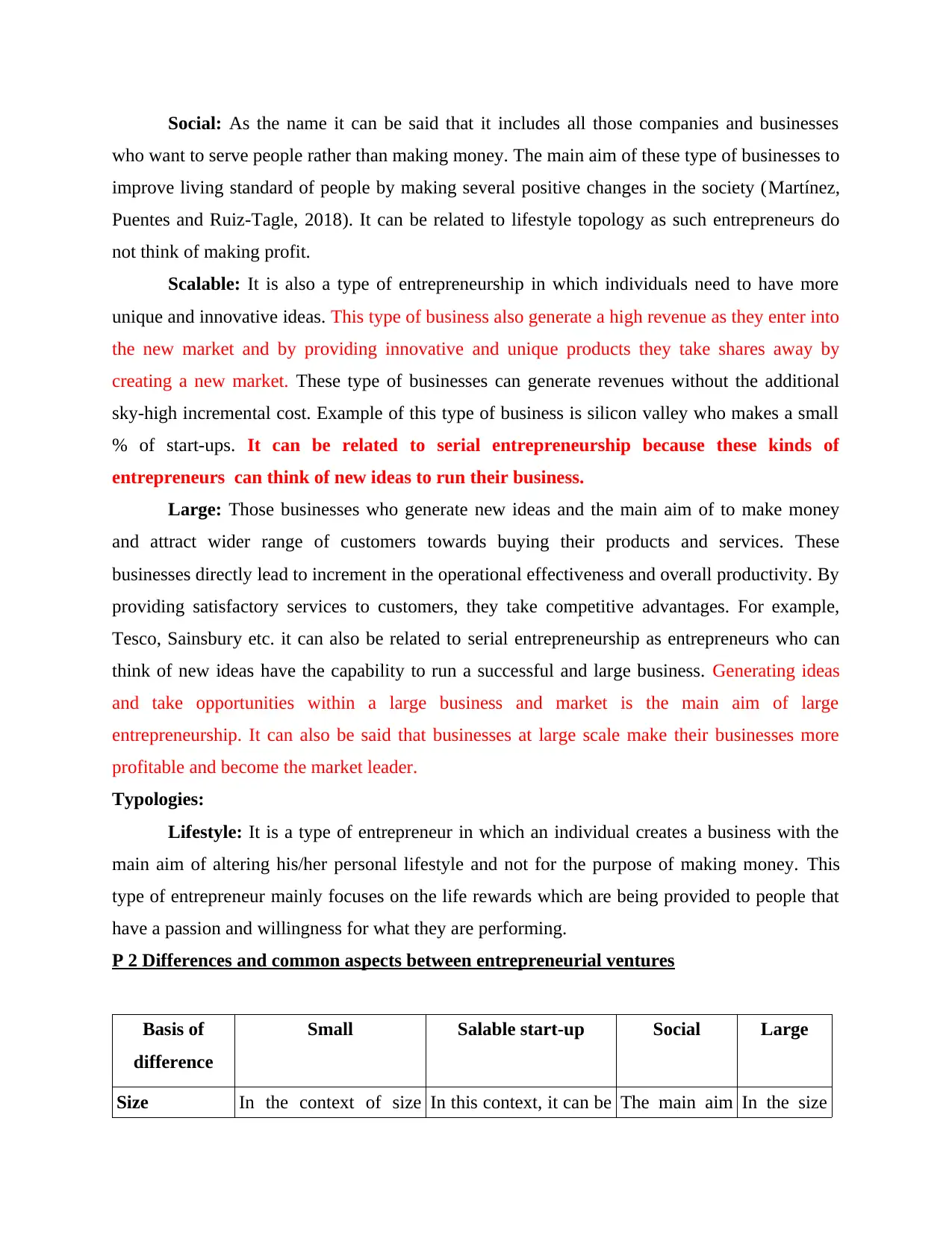
Social: As the name it can be said that it includes all those companies and businesses
who want to serve people rather than making money. The main aim of these type of businesses to
improve living standard of people by making several positive changes in the society (Martínez,
Puentes and Ruiz-Tagle, 2018). It can be related to lifestyle topology as such entrepreneurs do
not think of making profit.
Scalable: It is also a type of entrepreneurship in which individuals need to have more
unique and innovative ideas. This type of business also generate a high revenue as they enter into
the new market and by providing innovative and unique products they take shares away by
creating a new market. These type of businesses can generate revenues without the additional
sky-high incremental cost. Example of this type of business is silicon valley who makes a small
% of start-ups. It can be related to serial entrepreneurship because these kinds of
entrepreneurs can think of new ideas to run their business.
Large: Those businesses who generate new ideas and the main aim of to make money
and attract wider range of customers towards buying their products and services. These
businesses directly lead to increment in the operational effectiveness and overall productivity. By
providing satisfactory services to customers, they take competitive advantages. For example,
Tesco, Sainsbury etc. it can also be related to serial entrepreneurship as entrepreneurs who can
think of new ideas have the capability to run a successful and large business. Generating ideas
and take opportunities within a large business and market is the main aim of large
entrepreneurship. It can also be said that businesses at large scale make their businesses more
profitable and become the market leader.
Typologies:
Lifestyle: It is a type of entrepreneur in which an individual creates a business with the
main aim of altering his/her personal lifestyle and not for the purpose of making money. This
type of entrepreneur mainly focuses on the life rewards which are being provided to people that
have a passion and willingness for what they are performing.
P 2 Differences and common aspects between entrepreneurial ventures
Basis of
difference
Small Salable start-up Social Large
Size In the context of size In this context, it can be The main aim In the size
who want to serve people rather than making money. The main aim of these type of businesses to
improve living standard of people by making several positive changes in the society (Martínez,
Puentes and Ruiz-Tagle, 2018). It can be related to lifestyle topology as such entrepreneurs do
not think of making profit.
Scalable: It is also a type of entrepreneurship in which individuals need to have more
unique and innovative ideas. This type of business also generate a high revenue as they enter into
the new market and by providing innovative and unique products they take shares away by
creating a new market. These type of businesses can generate revenues without the additional
sky-high incremental cost. Example of this type of business is silicon valley who makes a small
% of start-ups. It can be related to serial entrepreneurship because these kinds of
entrepreneurs can think of new ideas to run their business.
Large: Those businesses who generate new ideas and the main aim of to make money
and attract wider range of customers towards buying their products and services. These
businesses directly lead to increment in the operational effectiveness and overall productivity. By
providing satisfactory services to customers, they take competitive advantages. For example,
Tesco, Sainsbury etc. it can also be related to serial entrepreneurship as entrepreneurs who can
think of new ideas have the capability to run a successful and large business. Generating ideas
and take opportunities within a large business and market is the main aim of large
entrepreneurship. It can also be said that businesses at large scale make their businesses more
profitable and become the market leader.
Typologies:
Lifestyle: It is a type of entrepreneur in which an individual creates a business with the
main aim of altering his/her personal lifestyle and not for the purpose of making money. This
type of entrepreneur mainly focuses on the life rewards which are being provided to people that
have a passion and willingness for what they are performing.
P 2 Differences and common aspects between entrepreneurial ventures
Basis of
difference
Small Salable start-up Social Large
Size In the context of size In this context, it can be The main aim In the size
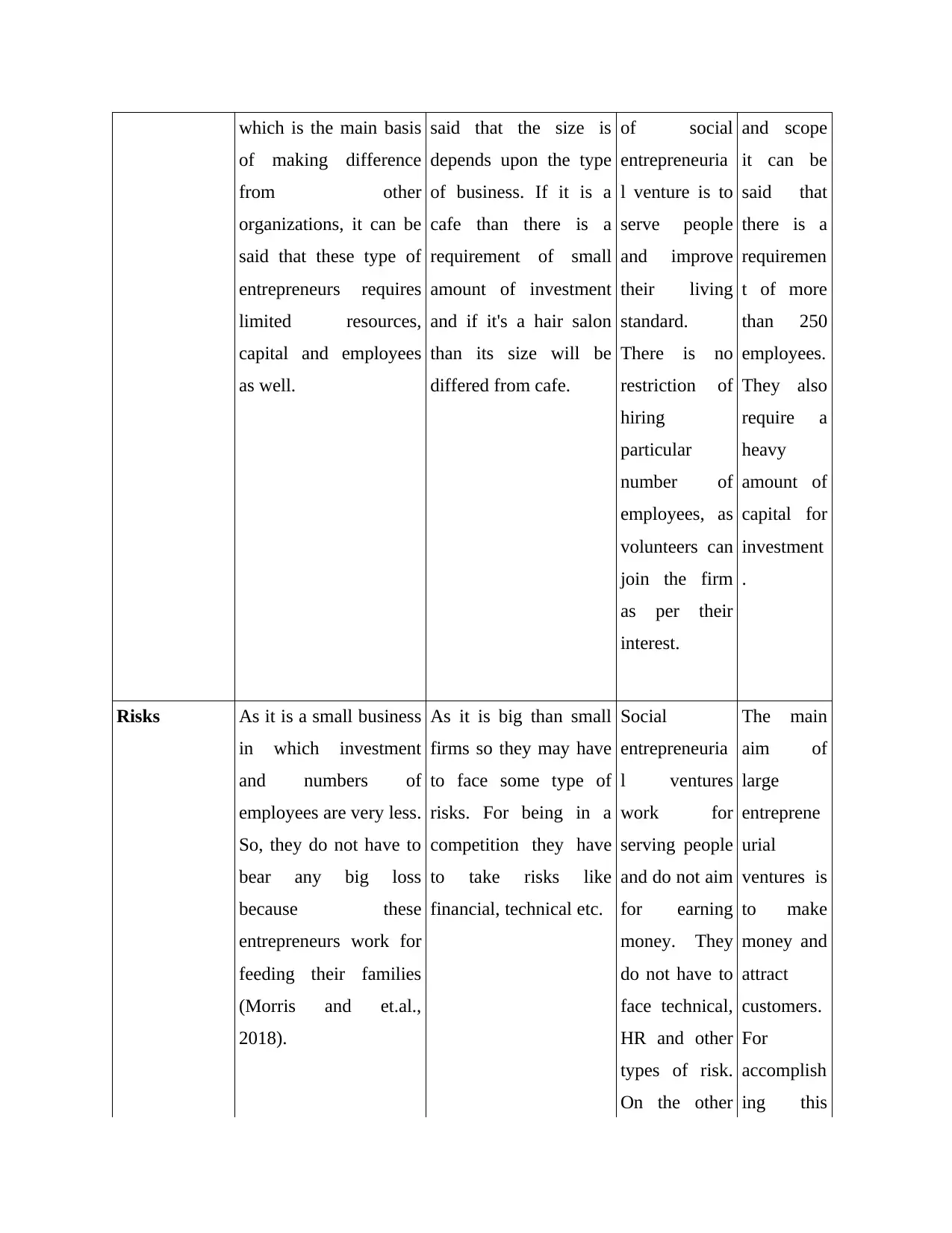
which is the main basis
of making difference
from other
organizations, it can be
said that these type of
entrepreneurs requires
limited resources,
capital and employees
as well.
said that the size is
depends upon the type
of business. If it is a
cafe than there is a
requirement of small
amount of investment
and if it's a hair salon
than its size will be
differed from cafe.
of social
entrepreneuria
l venture is to
serve people
and improve
their living
standard.
There is no
restriction of
hiring
particular
number of
employees, as
volunteers can
join the firm
as per their
interest.
and scope
it can be
said that
there is a
requiremen
t of more
than 250
employees.
They also
require a
heavy
amount of
capital for
investment
.
Risks As it is a small business
in which investment
and numbers of
employees are very less.
So, they do not have to
bear any big loss
because these
entrepreneurs work for
feeding their families
(Morris and et.al.,
2018).
As it is big than small
firms so they may have
to face some type of
risks. For being in a
competition they have
to take risks like
financial, technical etc.
Social
entrepreneuria
l ventures
work for
serving people
and do not aim
for earning
money. They
do not have to
face technical,
HR and other
types of risk.
On the other
The main
aim of
large
entreprene
urial
ventures is
to make
money and
attract
customers.
For
accomplish
ing this
of making difference
from other
organizations, it can be
said that these type of
entrepreneurs requires
limited resources,
capital and employees
as well.
said that the size is
depends upon the type
of business. If it is a
cafe than there is a
requirement of small
amount of investment
and if it's a hair salon
than its size will be
differed from cafe.
of social
entrepreneuria
l venture is to
serve people
and improve
their living
standard.
There is no
restriction of
hiring
particular
number of
employees, as
volunteers can
join the firm
as per their
interest.
and scope
it can be
said that
there is a
requiremen
t of more
than 250
employees.
They also
require a
heavy
amount of
capital for
investment
.
Risks As it is a small business
in which investment
and numbers of
employees are very less.
So, they do not have to
bear any big loss
because these
entrepreneurs work for
feeding their families
(Morris and et.al.,
2018).
As it is big than small
firms so they may have
to face some type of
risks. For being in a
competition they have
to take risks like
financial, technical etc.
Social
entrepreneuria
l ventures
work for
serving people
and do not aim
for earning
money. They
do not have to
face technical,
HR and other
types of risk.
On the other
The main
aim of
large
entreprene
urial
ventures is
to make
money and
attract
customers.
For
accomplish
ing this
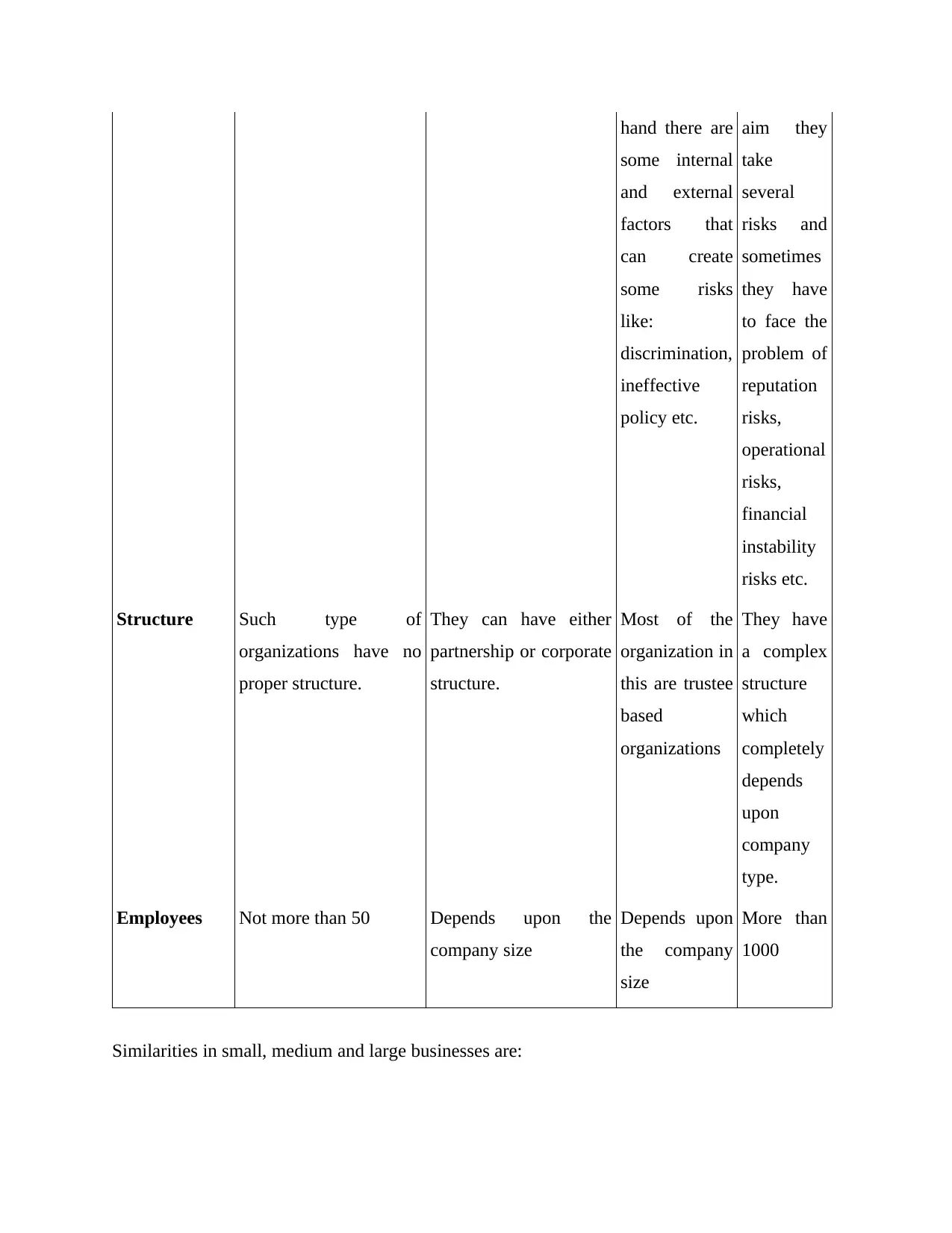
hand there are
some internal
and external
factors that
can create
some risks
like:
discrimination,
ineffective
policy etc.
aim they
take
several
risks and
sometimes
they have
to face the
problem of
reputation
risks,
operational
risks,
financial
instability
risks etc.
Structure Such type of
organizations have no
proper structure.
They can have either
partnership or corporate
structure.
Most of the
organization in
this are trustee
based
organizations
They have
a complex
structure
which
completely
depends
upon
company
type.
Employees Not more than 50 Depends upon the
company size
Depends upon
the company
size
More than
1000
Similarities in small, medium and large businesses are:
some internal
and external
factors that
can create
some risks
like:
discrimination,
ineffective
policy etc.
aim they
take
several
risks and
sometimes
they have
to face the
problem of
reputation
risks,
operational
risks,
financial
instability
risks etc.
Structure Such type of
organizations have no
proper structure.
They can have either
partnership or corporate
structure.
Most of the
organization in
this are trustee
based
organizations
They have
a complex
structure
which
completely
depends
upon
company
type.
Employees Not more than 50 Depends upon the
company size
Depends upon
the company
size
More than
1000
Similarities in small, medium and large businesses are:
Paraphrase This Document
Need a fresh take? Get an instant paraphrase of this document with our AI Paraphraser
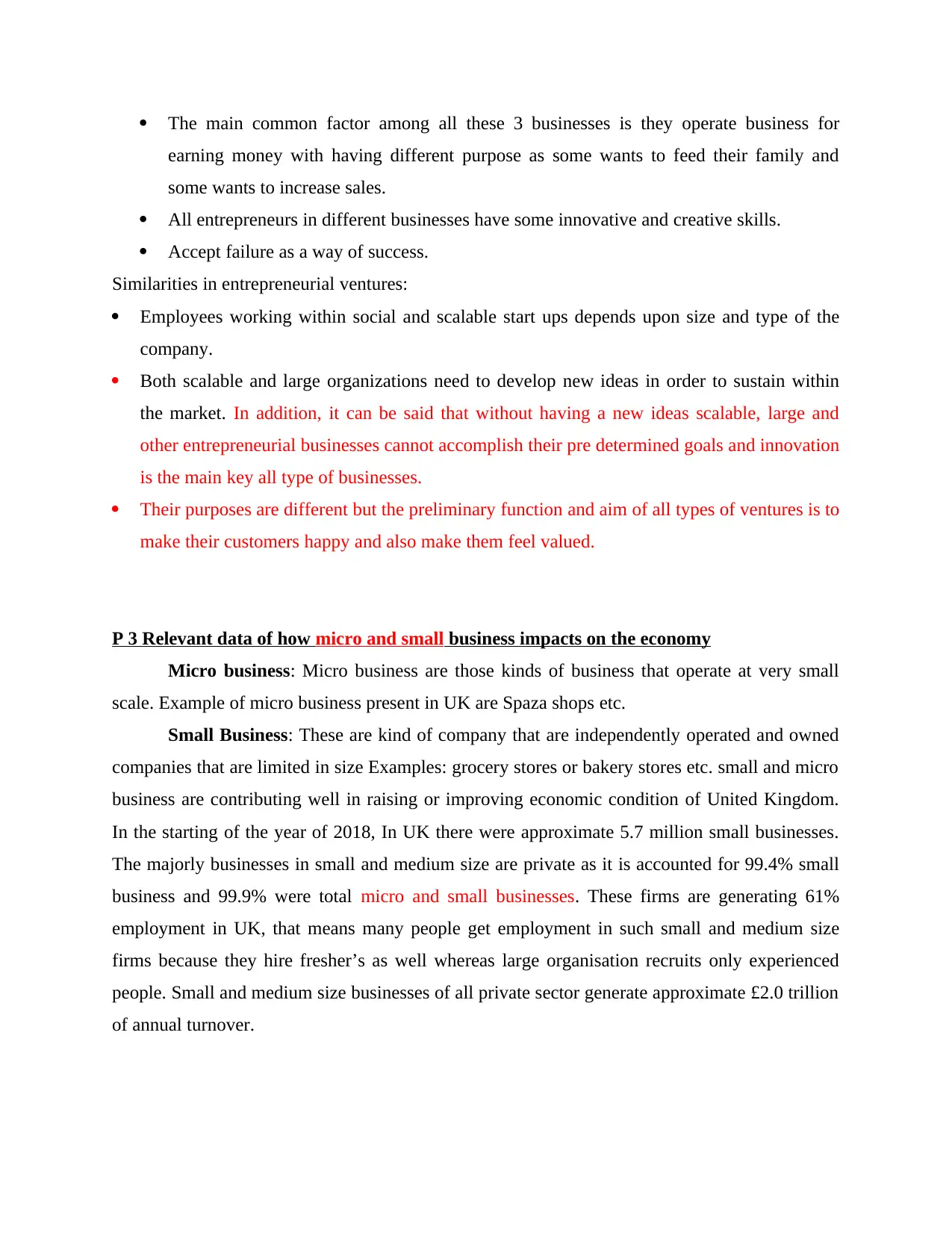
The main common factor among all these 3 businesses is they operate business for
earning money with having different purpose as some wants to feed their family and
some wants to increase sales.
All entrepreneurs in different businesses have some innovative and creative skills.
Accept failure as a way of success.
Similarities in entrepreneurial ventures:
Employees working within social and scalable start ups depends upon size and type of the
company.
Both scalable and large organizations need to develop new ideas in order to sustain within
the market. In addition, it can be said that without having a new ideas scalable, large and
other entrepreneurial businesses cannot accomplish their pre determined goals and innovation
is the main key all type of businesses.
Their purposes are different but the preliminary function and aim of all types of ventures is to
make their customers happy and also make them feel valued.
P 3 Relevant data of how micro and small business impacts on the economy
Micro business: Micro business are those kinds of business that operate at very small
scale. Example of micro business present in UK are Spaza shops etc.
Small Business: These are kind of company that are independently operated and owned
companies that are limited in size Examples: grocery stores or bakery stores etc. small and micro
business are contributing well in raising or improving economic condition of United Kingdom.
In the starting of the year of 2018, In UK there were approximate 5.7 million small businesses.
The majorly businesses in small and medium size are private as it is accounted for 99.4% small
business and 99.9% were total micro and small businesses. These firms are generating 61%
employment in UK, that means many people get employment in such small and medium size
firms because they hire fresher’s as well whereas large organisation recruits only experienced
people. Small and medium size businesses of all private sector generate approximate £2.0 trillion
of annual turnover.
earning money with having different purpose as some wants to feed their family and
some wants to increase sales.
All entrepreneurs in different businesses have some innovative and creative skills.
Accept failure as a way of success.
Similarities in entrepreneurial ventures:
Employees working within social and scalable start ups depends upon size and type of the
company.
Both scalable and large organizations need to develop new ideas in order to sustain within
the market. In addition, it can be said that without having a new ideas scalable, large and
other entrepreneurial businesses cannot accomplish their pre determined goals and innovation
is the main key all type of businesses.
Their purposes are different but the preliminary function and aim of all types of ventures is to
make their customers happy and also make them feel valued.
P 3 Relevant data of how micro and small business impacts on the economy
Micro business: Micro business are those kinds of business that operate at very small
scale. Example of micro business present in UK are Spaza shops etc.
Small Business: These are kind of company that are independently operated and owned
companies that are limited in size Examples: grocery stores or bakery stores etc. small and micro
business are contributing well in raising or improving economic condition of United Kingdom.
In the starting of the year of 2018, In UK there were approximate 5.7 million small businesses.
The majorly businesses in small and medium size are private as it is accounted for 99.4% small
business and 99.9% were total micro and small businesses. These firms are generating 61%
employment in UK, that means many people get employment in such small and medium size
firms because they hire fresher’s as well whereas large organisation recruits only experienced
people. Small and medium size businesses of all private sector generate approximate £2.0 trillion
of annual turnover.
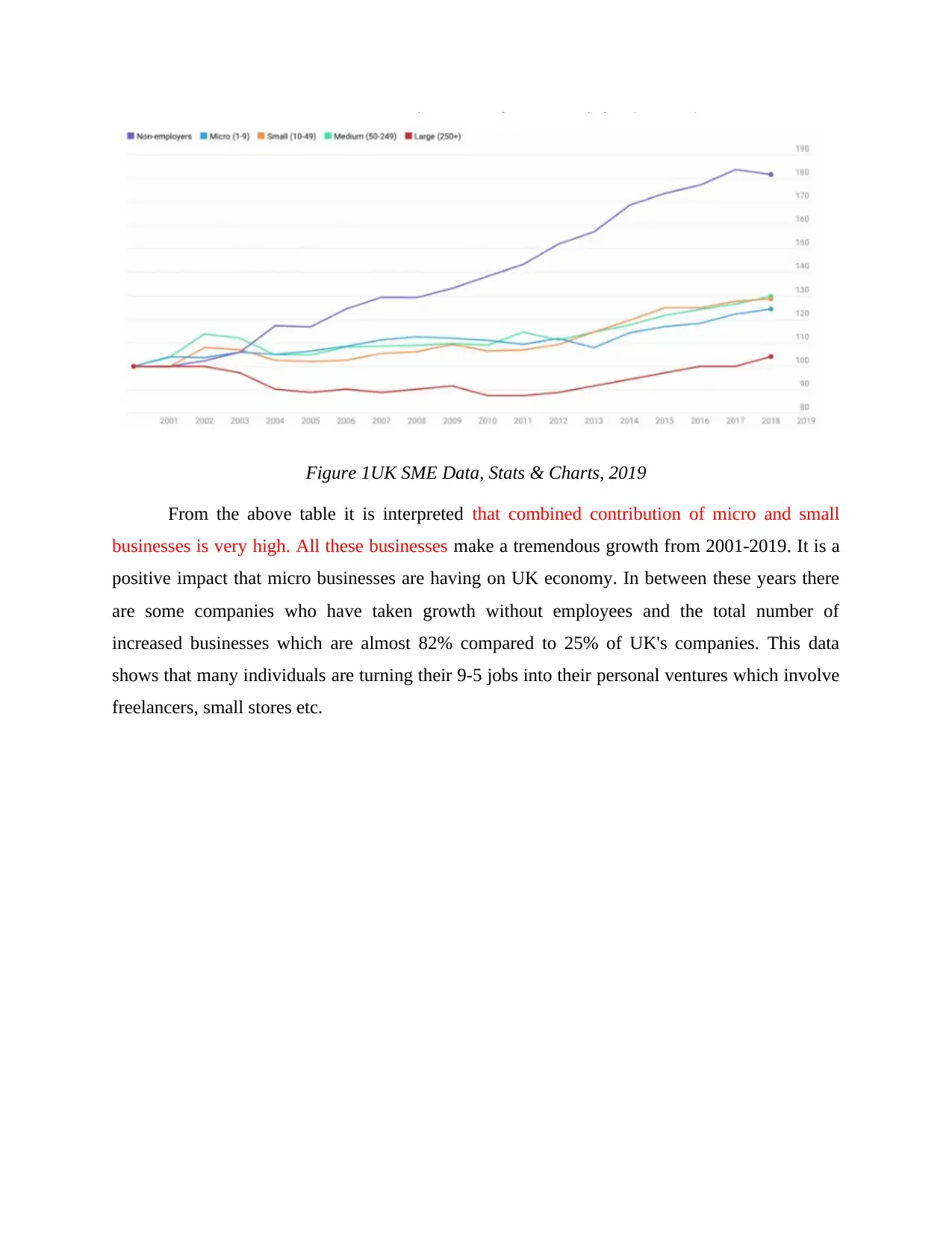
Figure 1UK SME Data, Stats & Charts, 2019
From the above table it is interpreted that combined contribution of micro and small
businesses is very high. All these businesses make a tremendous growth from 2001-2019. It is a
positive impact that micro businesses are having on UK economy. In between these years there
are some companies who have taken growth without employees and the total number of
increased businesses which are almost 82% compared to 25% of UK's companies. This data
shows that many individuals are turning their 9-5 jobs into their personal ventures which involve
freelancers, small stores etc.
From the above table it is interpreted that combined contribution of micro and small
businesses is very high. All these businesses make a tremendous growth from 2001-2019. It is a
positive impact that micro businesses are having on UK economy. In between these years there
are some companies who have taken growth without employees and the total number of
increased businesses which are almost 82% compared to 25% of UK's companies. This data
shows that many individuals are turning their 9-5 jobs into their personal ventures which involve
freelancers, small stores etc.
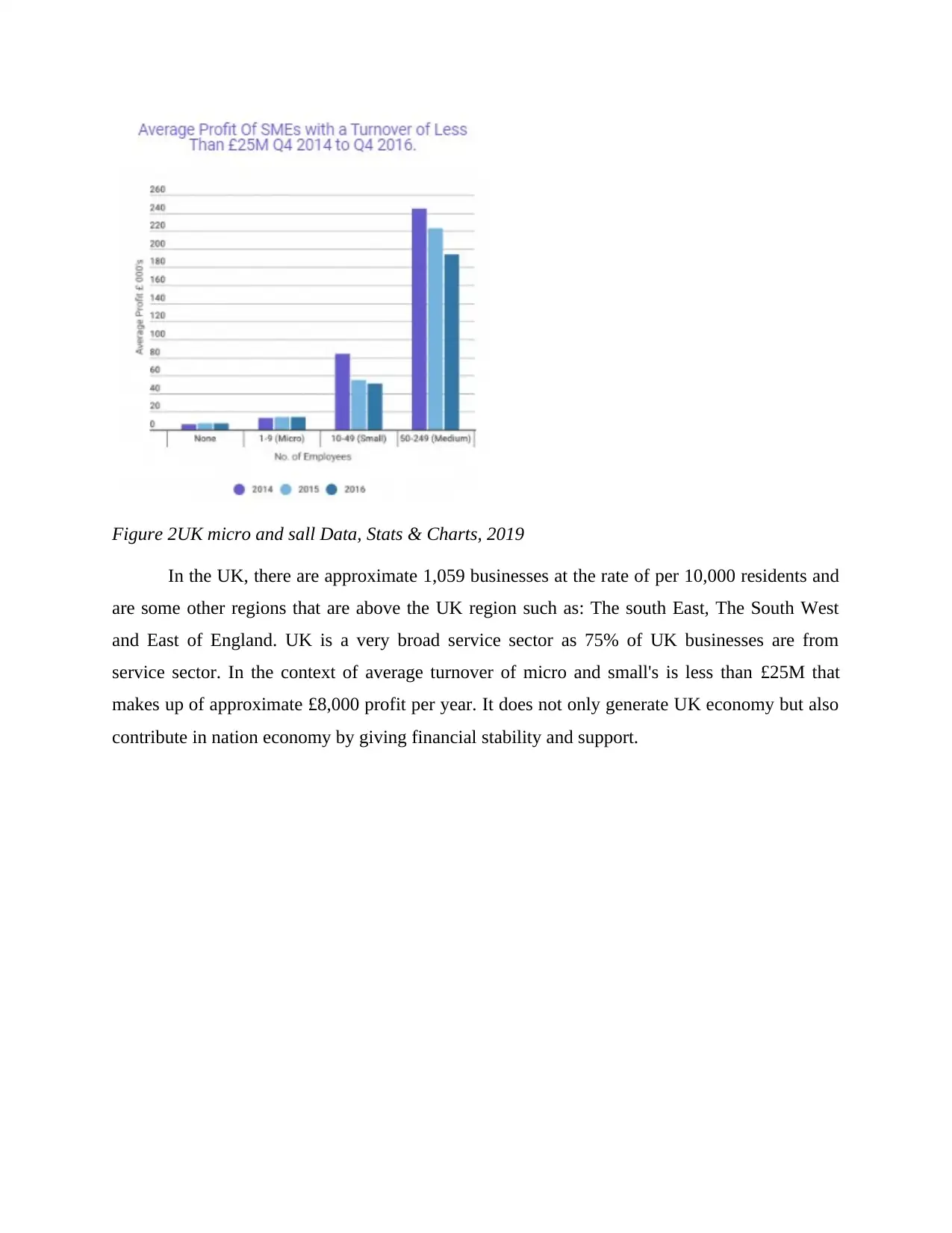
Figure 2UK micro and sall Data, Stats & Charts, 2019
In the UK, there are approximate 1,059 businesses at the rate of per 10,000 residents and
are some other regions that are above the UK region such as: The south East, The South West
and East of England. UK is a very broad service sector as 75% of UK businesses are from
service sector. In the context of average turnover of micro and small's is less than £25M that
makes up of approximate £8,000 profit per year. It does not only generate UK economy but also
contribute in nation economy by giving financial stability and support.
In the UK, there are approximate 1,059 businesses at the rate of per 10,000 residents and
are some other regions that are above the UK region such as: The south East, The South West
and East of England. UK is a very broad service sector as 75% of UK businesses are from
service sector. In the context of average turnover of micro and small's is less than £25M that
makes up of approximate £8,000 profit per year. It does not only generate UK economy but also
contribute in nation economy by giving financial stability and support.
Secure Best Marks with AI Grader
Need help grading? Try our AI Grader for instant feedback on your assignments.
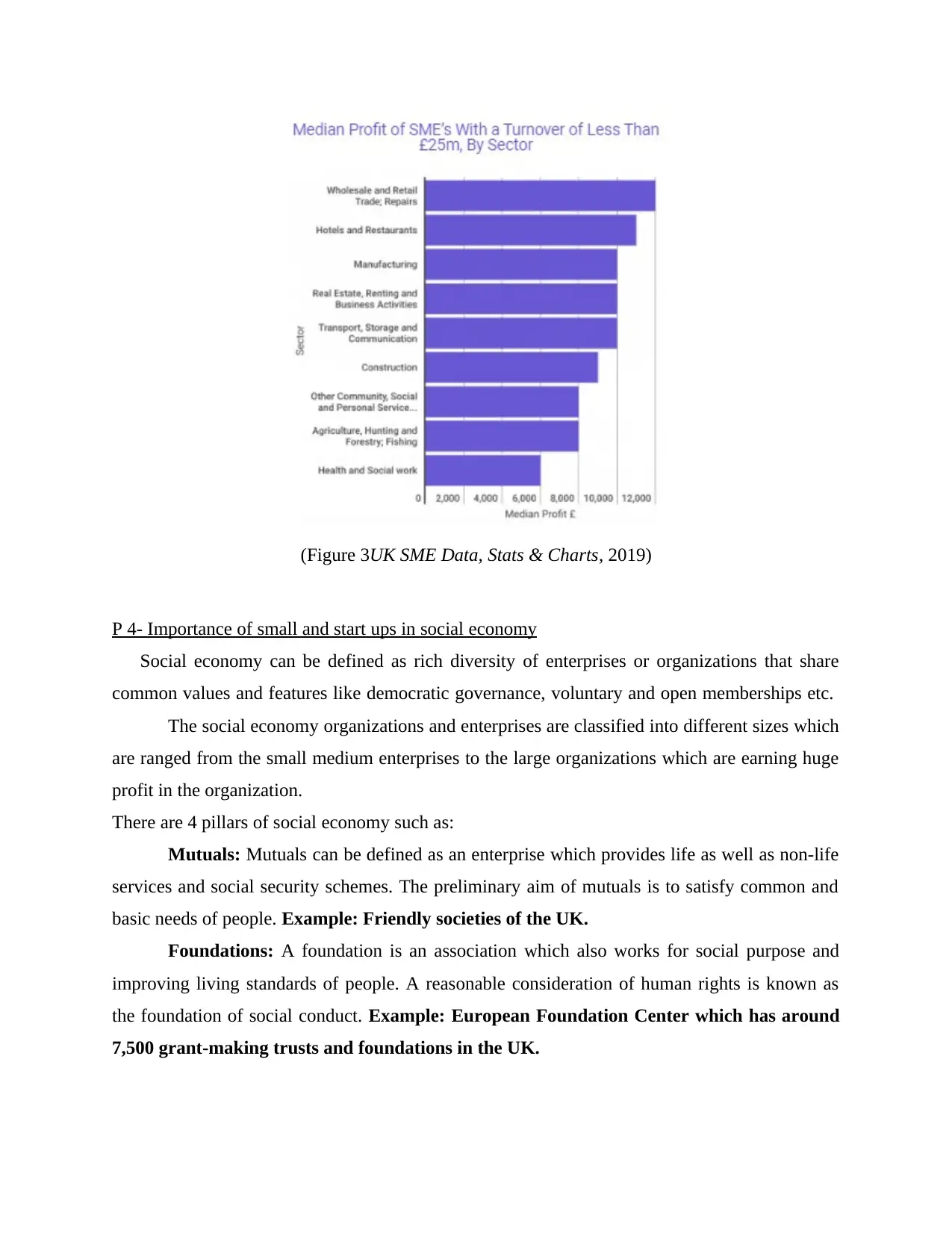
(Figure 3UK SME Data, Stats & Charts, 2019)
P 4- Importance of small and start ups in social economy
Social economy can be defined as rich diversity of enterprises or organizations that share
common values and features like democratic governance, voluntary and open memberships etc.
The social economy organizations and enterprises are classified into different sizes which
are ranged from the small medium enterprises to the large organizations which are earning huge
profit in the organization.
There are 4 pillars of social economy such as:
Mutuals: Mutuals can be defined as an enterprise which provides life as well as non-life
services and social security schemes. The preliminary aim of mutuals is to satisfy common and
basic needs of people. Example: Friendly societies of the UK.
Foundations: A foundation is an association which also works for social purpose and
improving living standards of people. A reasonable consideration of human rights is known as
the foundation of social conduct. Example: European Foundation Center which has around
7,500 grant-making trusts and foundations in the UK.
P 4- Importance of small and start ups in social economy
Social economy can be defined as rich diversity of enterprises or organizations that share
common values and features like democratic governance, voluntary and open memberships etc.
The social economy organizations and enterprises are classified into different sizes which
are ranged from the small medium enterprises to the large organizations which are earning huge
profit in the organization.
There are 4 pillars of social economy such as:
Mutuals: Mutuals can be defined as an enterprise which provides life as well as non-life
services and social security schemes. The preliminary aim of mutuals is to satisfy common and
basic needs of people. Example: Friendly societies of the UK.
Foundations: A foundation is an association which also works for social purpose and
improving living standards of people. A reasonable consideration of human rights is known as
the foundation of social conduct. Example: European Foundation Center which has around
7,500 grant-making trusts and foundations in the UK.
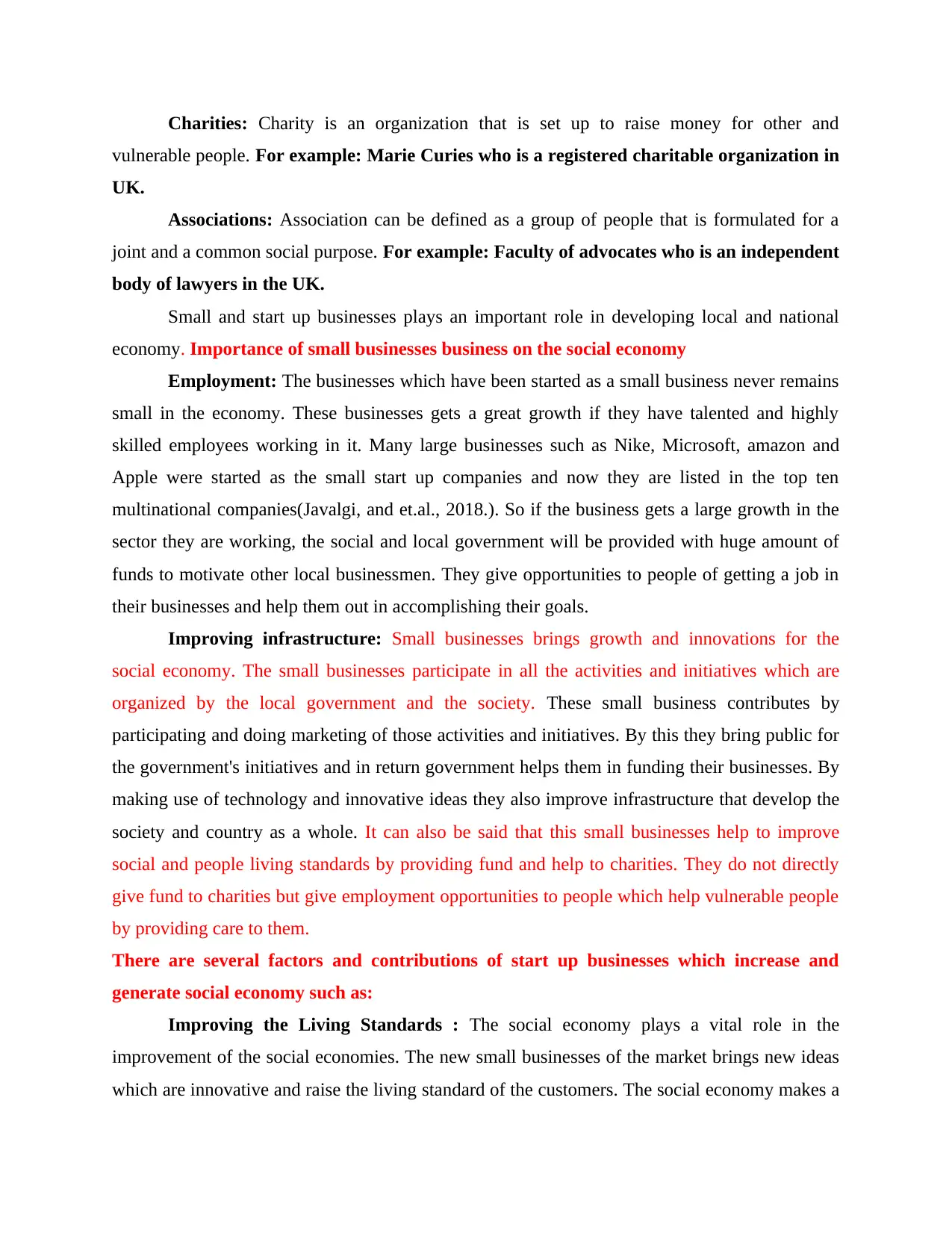
Charities: Charity is an organization that is set up to raise money for other and
vulnerable people. For example: Marie Curies who is a registered charitable organization in
UK.
Associations: Association can be defined as a group of people that is formulated for a
joint and a common social purpose. For example: Faculty of advocates who is an independent
body of lawyers in the UK.
Small and start up businesses plays an important role in developing local and national
economy. Importance of small businesses business on the social economy
Employment: The businesses which have been started as a small business never remains
small in the economy. These businesses gets a great growth if they have talented and highly
skilled employees working in it. Many large businesses such as Nike, Microsoft, amazon and
Apple were started as the small start up companies and now they are listed in the top ten
multinational companies(Javalgi, and et.al., 2018.). So if the business gets a large growth in the
sector they are working, the social and local government will be provided with huge amount of
funds to motivate other local businessmen. They give opportunities to people of getting a job in
their businesses and help them out in accomplishing their goals.
Improving infrastructure: Small businesses brings growth and innovations for the
social economy. The small businesses participate in all the activities and initiatives which are
organized by the local government and the society. These small business contributes by
participating and doing marketing of those activities and initiatives. By this they bring public for
the government's initiatives and in return government helps them in funding their businesses. By
making use of technology and innovative ideas they also improve infrastructure that develop the
society and country as a whole. It can also be said that this small businesses help to improve
social and people living standards by providing fund and help to charities. They do not directly
give fund to charities but give employment opportunities to people which help vulnerable people
by providing care to them.
There are several factors and contributions of start up businesses which increase and
generate social economy such as:
Improving the Living Standards : The social economy plays a vital role in the
improvement of the social economies. The new small businesses of the market brings new ideas
which are innovative and raise the living standard of the customers. The social economy makes a
vulnerable people. For example: Marie Curies who is a registered charitable organization in
UK.
Associations: Association can be defined as a group of people that is formulated for a
joint and a common social purpose. For example: Faculty of advocates who is an independent
body of lawyers in the UK.
Small and start up businesses plays an important role in developing local and national
economy. Importance of small businesses business on the social economy
Employment: The businesses which have been started as a small business never remains
small in the economy. These businesses gets a great growth if they have talented and highly
skilled employees working in it. Many large businesses such as Nike, Microsoft, amazon and
Apple were started as the small start up companies and now they are listed in the top ten
multinational companies(Javalgi, and et.al., 2018.). So if the business gets a large growth in the
sector they are working, the social and local government will be provided with huge amount of
funds to motivate other local businessmen. They give opportunities to people of getting a job in
their businesses and help them out in accomplishing their goals.
Improving infrastructure: Small businesses brings growth and innovations for the
social economy. The small businesses participate in all the activities and initiatives which are
organized by the local government and the society. These small business contributes by
participating and doing marketing of those activities and initiatives. By this they bring public for
the government's initiatives and in return government helps them in funding their businesses. By
making use of technology and innovative ideas they also improve infrastructure that develop the
society and country as a whole. It can also be said that this small businesses help to improve
social and people living standards by providing fund and help to charities. They do not directly
give fund to charities but give employment opportunities to people which help vulnerable people
by providing care to them.
There are several factors and contributions of start up businesses which increase and
generate social economy such as:
Improving the Living Standards : The social economy plays a vital role in the
improvement of the social economies. The new small businesses of the market brings new ideas
which are innovative and raise the living standard of the customers. The social economy makes a
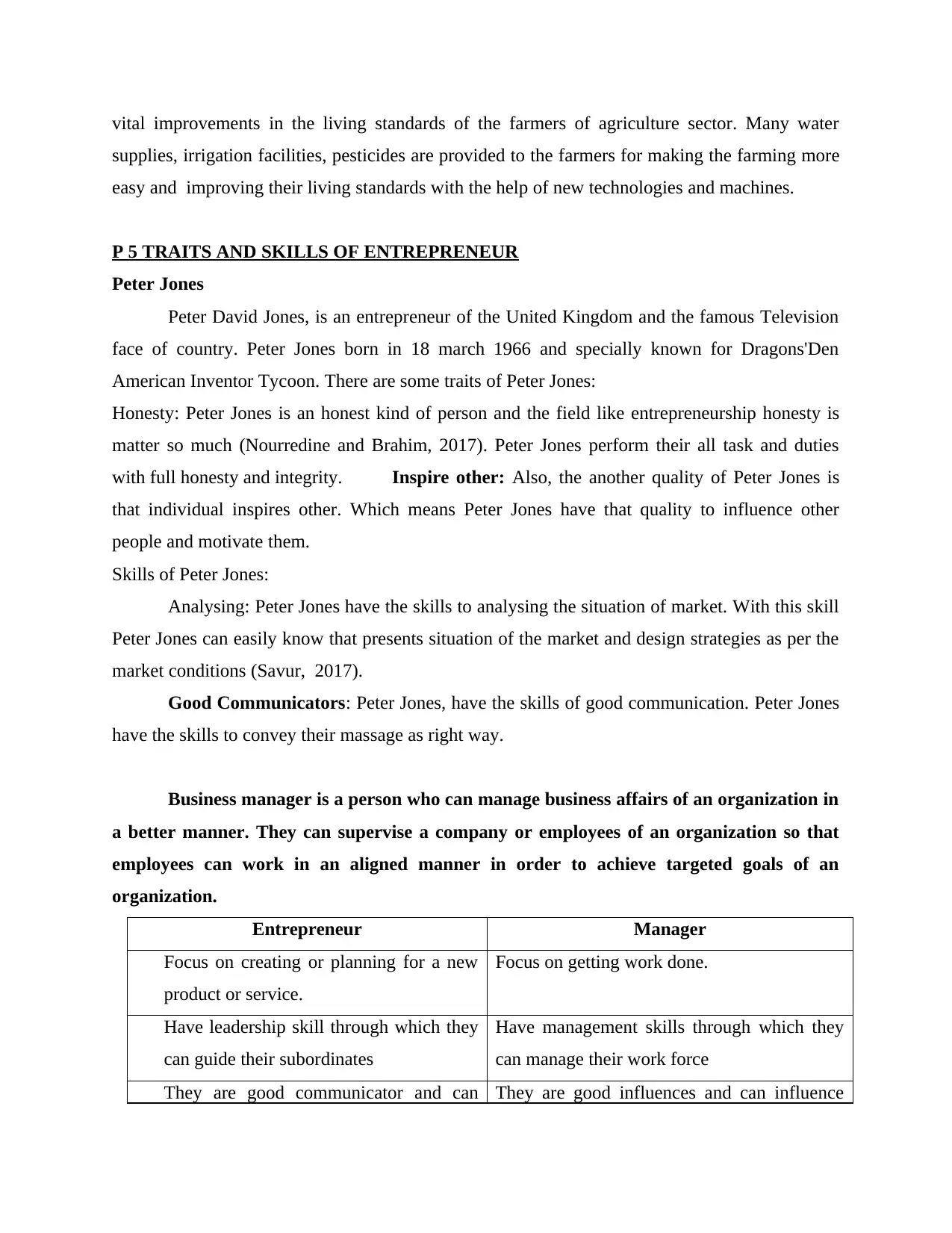
vital improvements in the living standards of the farmers of agriculture sector. Many water
supplies, irrigation facilities, pesticides are provided to the farmers for making the farming more
easy and improving their living standards with the help of new technologies and machines.
P 5 TRAITS AND SKILLS OF ENTREPRENEUR
Peter Jones
Peter David Jones, is an entrepreneur of the United Kingdom and the famous Television
face of country. Peter Jones born in 18 march 1966 and specially known for Dragons'Den
American Inventor Tycoon. There are some traits of Peter Jones:
Honesty: Peter Jones is an honest kind of person and the field like entrepreneurship honesty is
matter so much (Nourredine and Brahim, 2017). Peter Jones perform their all task and duties
with full honesty and integrity. Inspire other: Also, the another quality of Peter Jones is
that individual inspires other. Which means Peter Jones have that quality to influence other
people and motivate them.
Skills of Peter Jones:
Analysing: Peter Jones have the skills to analysing the situation of market. With this skill
Peter Jones can easily know that presents situation of the market and design strategies as per the
market conditions (Savur, 2017).
Good Communicators: Peter Jones, have the skills of good communication. Peter Jones
have the skills to convey their massage as right way.
Business manager is a person who can manage business affairs of an organization in
a better manner. They can supervise a company or employees of an organization so that
employees can work in an aligned manner in order to achieve targeted goals of an
organization.
Entrepreneur Manager
Focus on creating or planning for a new
product or service.
Focus on getting work done.
Have leadership skill through which they
can guide their subordinates
Have management skills through which they
can manage their work force
They are good communicator and can They are good influences and can influence
supplies, irrigation facilities, pesticides are provided to the farmers for making the farming more
easy and improving their living standards with the help of new technologies and machines.
P 5 TRAITS AND SKILLS OF ENTREPRENEUR
Peter Jones
Peter David Jones, is an entrepreneur of the United Kingdom and the famous Television
face of country. Peter Jones born in 18 march 1966 and specially known for Dragons'Den
American Inventor Tycoon. There are some traits of Peter Jones:
Honesty: Peter Jones is an honest kind of person and the field like entrepreneurship honesty is
matter so much (Nourredine and Brahim, 2017). Peter Jones perform their all task and duties
with full honesty and integrity. Inspire other: Also, the another quality of Peter Jones is
that individual inspires other. Which means Peter Jones have that quality to influence other
people and motivate them.
Skills of Peter Jones:
Analysing: Peter Jones have the skills to analysing the situation of market. With this skill
Peter Jones can easily know that presents situation of the market and design strategies as per the
market conditions (Savur, 2017).
Good Communicators: Peter Jones, have the skills of good communication. Peter Jones
have the skills to convey their massage as right way.
Business manager is a person who can manage business affairs of an organization in
a better manner. They can supervise a company or employees of an organization so that
employees can work in an aligned manner in order to achieve targeted goals of an
organization.
Entrepreneur Manager
Focus on creating or planning for a new
product or service.
Focus on getting work done.
Have leadership skill through which they
can guide their subordinates
Have management skills through which they
can manage their work force
They are good communicator and can They are good influences and can influence
Paraphrase This Document
Need a fresh take? Get an instant paraphrase of this document with our AI Paraphraser
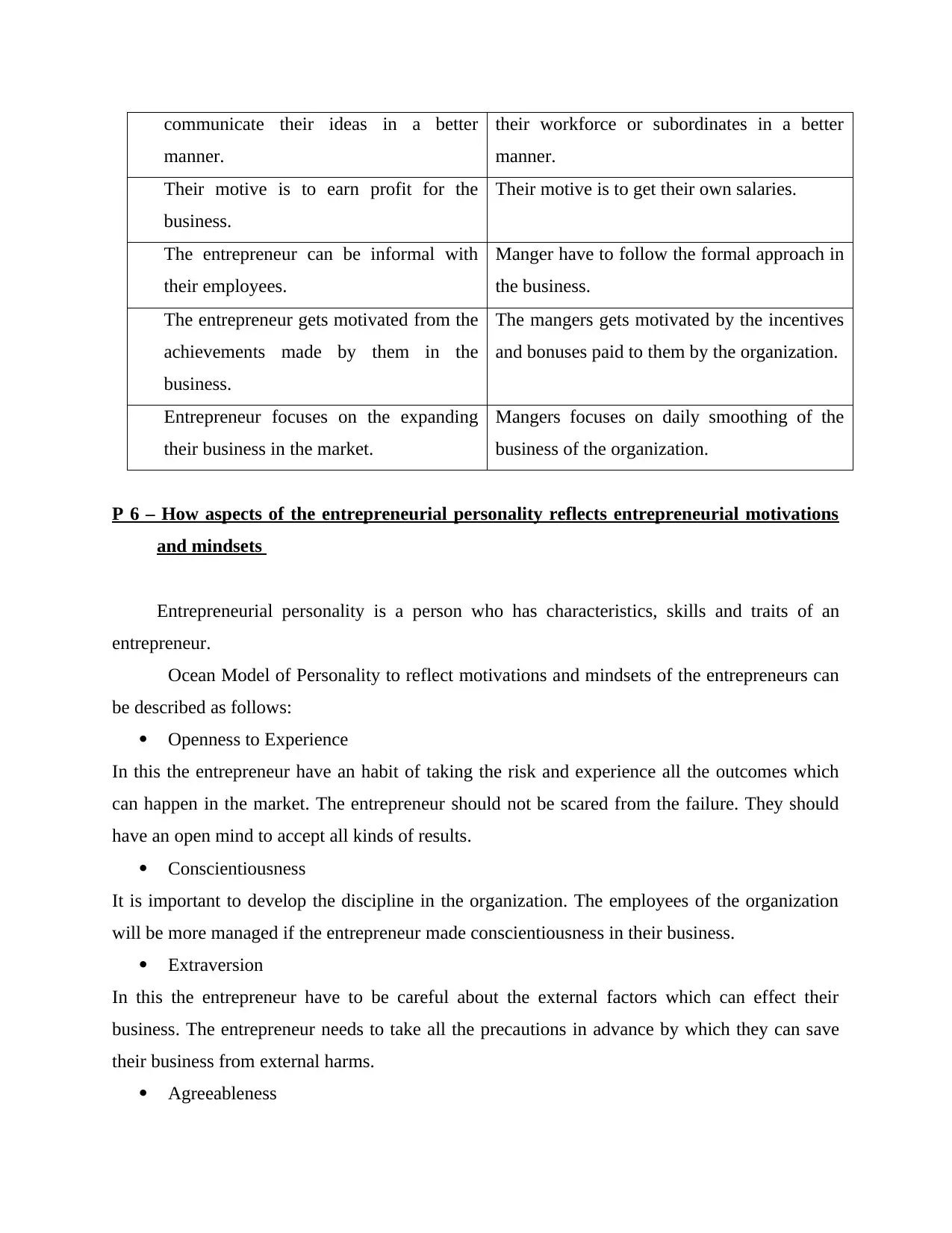
communicate their ideas in a better
manner.
their workforce or subordinates in a better
manner.
Their motive is to earn profit for the
business.
Their motive is to get their own salaries.
The entrepreneur can be informal with
their employees.
Manger have to follow the formal approach in
the business.
The entrepreneur gets motivated from the
achievements made by them in the
business.
The mangers gets motivated by the incentives
and bonuses paid to them by the organization.
Entrepreneur focuses on the expanding
their business in the market.
Mangers focuses on daily smoothing of the
business of the organization.
P 6 – How aspects of the entrepreneurial personality reflects entrepreneurial motivations
and mindsets
Entrepreneurial personality is a person who has characteristics, skills and traits of an
entrepreneur.
Ocean Model of Personality to reflect motivations and mindsets of the entrepreneurs can
be described as follows:
Openness to Experience
In this the entrepreneur have an habit of taking the risk and experience all the outcomes which
can happen in the market. The entrepreneur should not be scared from the failure. They should
have an open mind to accept all kinds of results.
Conscientiousness
It is important to develop the discipline in the organization. The employees of the organization
will be more managed if the entrepreneur made conscientiousness in their business.
Extraversion
In this the entrepreneur have to be careful about the external factors which can effect their
business. The entrepreneur needs to take all the precautions in advance by which they can save
their business from external harms.
Agreeableness
manner.
their workforce or subordinates in a better
manner.
Their motive is to earn profit for the
business.
Their motive is to get their own salaries.
The entrepreneur can be informal with
their employees.
Manger have to follow the formal approach in
the business.
The entrepreneur gets motivated from the
achievements made by them in the
business.
The mangers gets motivated by the incentives
and bonuses paid to them by the organization.
Entrepreneur focuses on the expanding
their business in the market.
Mangers focuses on daily smoothing of the
business of the organization.
P 6 – How aspects of the entrepreneurial personality reflects entrepreneurial motivations
and mindsets
Entrepreneurial personality is a person who has characteristics, skills and traits of an
entrepreneur.
Ocean Model of Personality to reflect motivations and mindsets of the entrepreneurs can
be described as follows:
Openness to Experience
In this the entrepreneur have an habit of taking the risk and experience all the outcomes which
can happen in the market. The entrepreneur should not be scared from the failure. They should
have an open mind to accept all kinds of results.
Conscientiousness
It is important to develop the discipline in the organization. The employees of the organization
will be more managed if the entrepreneur made conscientiousness in their business.
Extraversion
In this the entrepreneur have to be careful about the external factors which can effect their
business. The entrepreneur needs to take all the precautions in advance by which they can save
their business from external harms.
Agreeableness
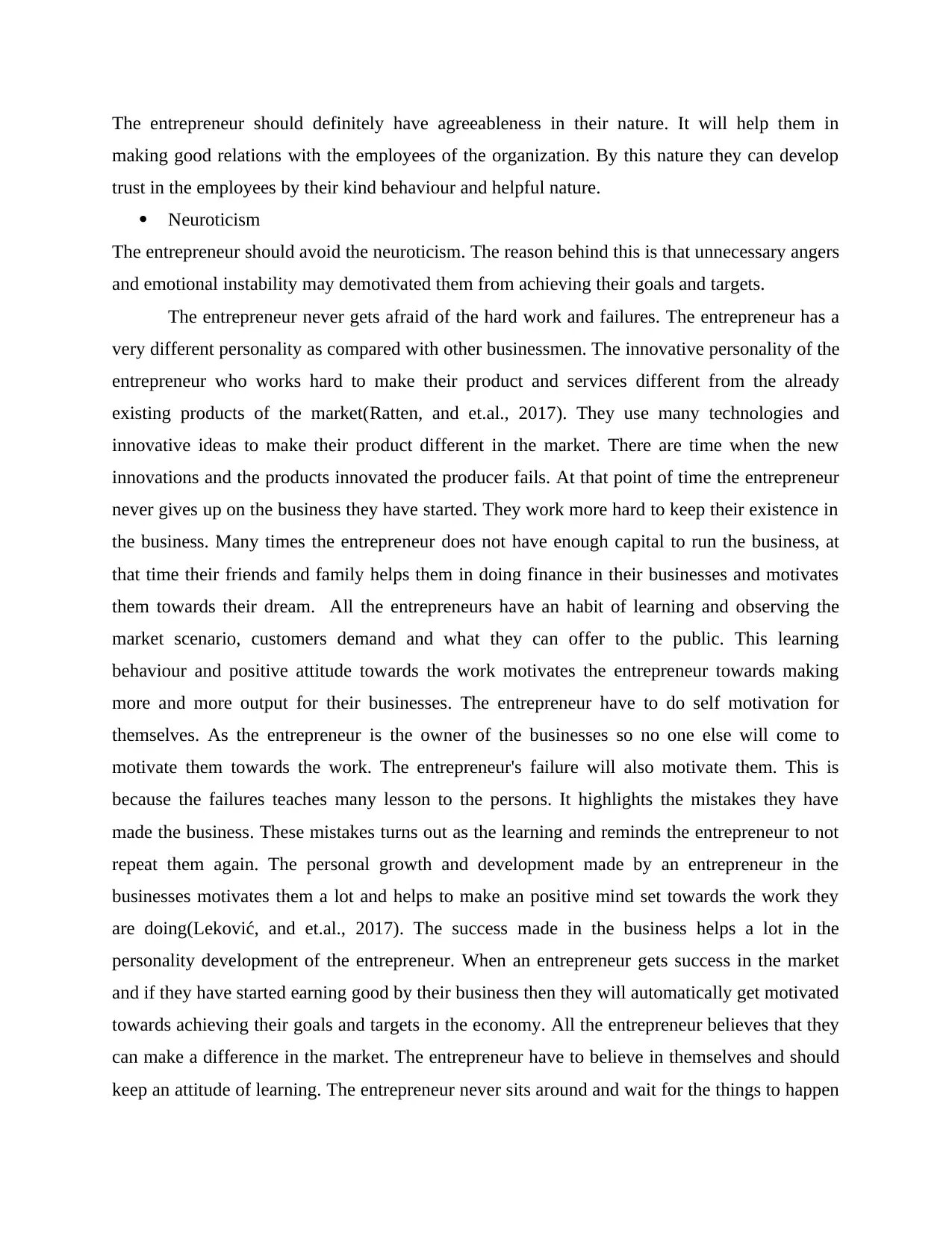
The entrepreneur should definitely have agreeableness in their nature. It will help them in
making good relations with the employees of the organization. By this nature they can develop
trust in the employees by their kind behaviour and helpful nature.
Neuroticism
The entrepreneur should avoid the neuroticism. The reason behind this is that unnecessary angers
and emotional instability may demotivated them from achieving their goals and targets.
The entrepreneur never gets afraid of the hard work and failures. The entrepreneur has a
very different personality as compared with other businessmen. The innovative personality of the
entrepreneur who works hard to make their product and services different from the already
existing products of the market(Ratten, and et.al., 2017). They use many technologies and
innovative ideas to make their product different in the market. There are time when the new
innovations and the products innovated the producer fails. At that point of time the entrepreneur
never gives up on the business they have started. They work more hard to keep their existence in
the business. Many times the entrepreneur does not have enough capital to run the business, at
that time their friends and family helps them in doing finance in their businesses and motivates
them towards their dream. All the entrepreneurs have an habit of learning and observing the
market scenario, customers demand and what they can offer to the public. This learning
behaviour and positive attitude towards the work motivates the entrepreneur towards making
more and more output for their businesses. The entrepreneur have to do self motivation for
themselves. As the entrepreneur is the owner of the businesses so no one else will come to
motivate them towards the work. The entrepreneur's failure will also motivate them. This is
because the failures teaches many lesson to the persons. It highlights the mistakes they have
made the business. These mistakes turns out as the learning and reminds the entrepreneur to not
repeat them again. The personal growth and development made by an entrepreneur in the
businesses motivates them a lot and helps to make an positive mind set towards the work they
are doing(Leković, and et.al., 2017). The success made in the business helps a lot in the
personality development of the entrepreneur. When an entrepreneur gets success in the market
and if they have started earning good by their business then they will automatically get motivated
towards achieving their goals and targets in the economy. All the entrepreneur believes that they
can make a difference in the market. The entrepreneur have to believe in themselves and should
keep an attitude of learning. The entrepreneur never sits around and wait for the things to happen
making good relations with the employees of the organization. By this nature they can develop
trust in the employees by their kind behaviour and helpful nature.
Neuroticism
The entrepreneur should avoid the neuroticism. The reason behind this is that unnecessary angers
and emotional instability may demotivated them from achieving their goals and targets.
The entrepreneur never gets afraid of the hard work and failures. The entrepreneur has a
very different personality as compared with other businessmen. The innovative personality of the
entrepreneur who works hard to make their product and services different from the already
existing products of the market(Ratten, and et.al., 2017). They use many technologies and
innovative ideas to make their product different in the market. There are time when the new
innovations and the products innovated the producer fails. At that point of time the entrepreneur
never gives up on the business they have started. They work more hard to keep their existence in
the business. Many times the entrepreneur does not have enough capital to run the business, at
that time their friends and family helps them in doing finance in their businesses and motivates
them towards their dream. All the entrepreneurs have an habit of learning and observing the
market scenario, customers demand and what they can offer to the public. This learning
behaviour and positive attitude towards the work motivates the entrepreneur towards making
more and more output for their businesses. The entrepreneur have to do self motivation for
themselves. As the entrepreneur is the owner of the businesses so no one else will come to
motivate them towards the work. The entrepreneur's failure will also motivate them. This is
because the failures teaches many lesson to the persons. It highlights the mistakes they have
made the business. These mistakes turns out as the learning and reminds the entrepreneur to not
repeat them again. The personal growth and development made by an entrepreneur in the
businesses motivates them a lot and helps to make an positive mind set towards the work they
are doing(Leković, and et.al., 2017). The success made in the business helps a lot in the
personality development of the entrepreneur. When an entrepreneur gets success in the market
and if they have started earning good by their business then they will automatically get motivated
towards achieving their goals and targets in the economy. All the entrepreneur believes that they
can make a difference in the market. The entrepreneur have to believe in themselves and should
keep an attitude of learning. The entrepreneur never sits around and wait for the things to happen
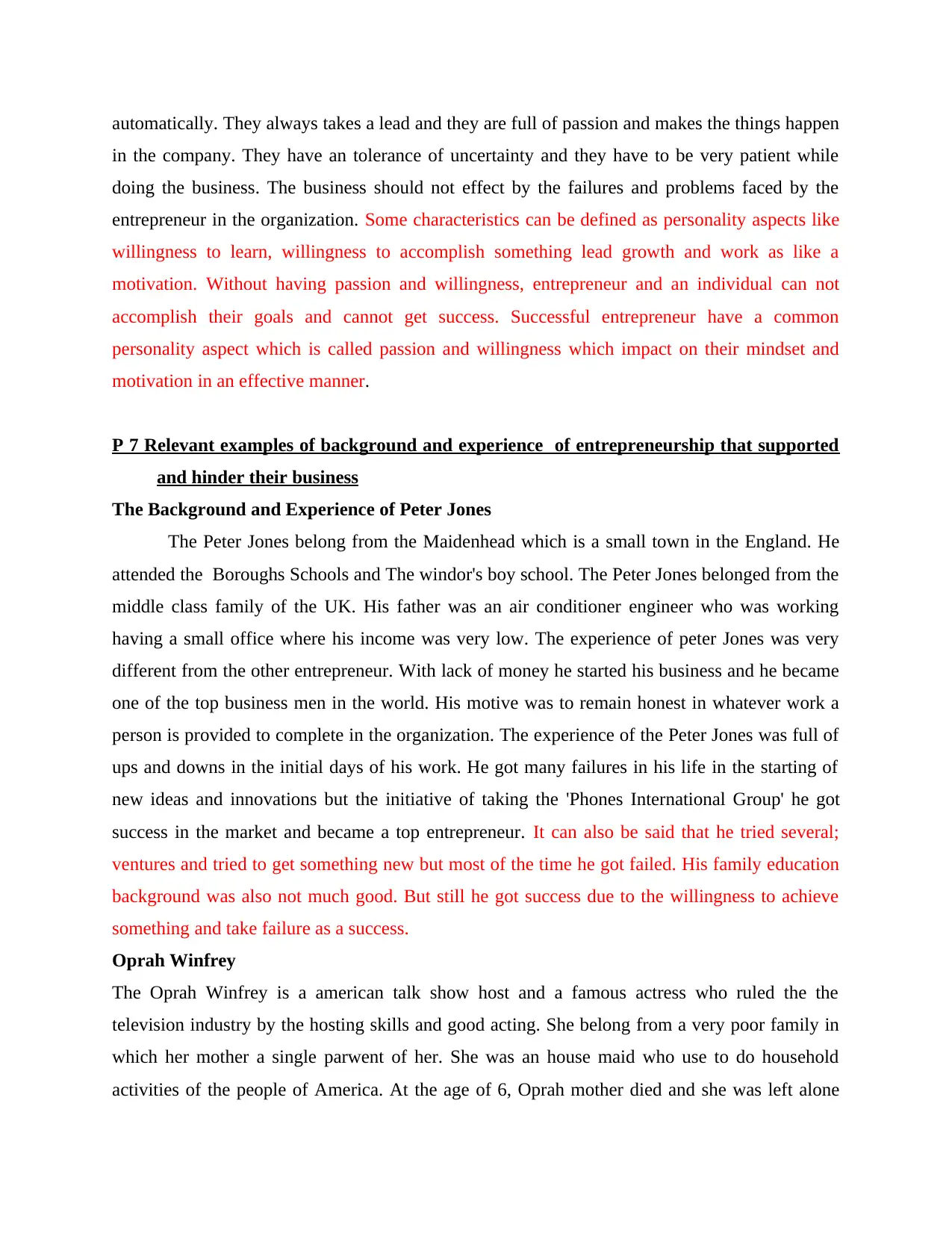
automatically. They always takes a lead and they are full of passion and makes the things happen
in the company. They have an tolerance of uncertainty and they have to be very patient while
doing the business. The business should not effect by the failures and problems faced by the
entrepreneur in the organization. Some characteristics can be defined as personality aspects like
willingness to learn, willingness to accomplish something lead growth and work as like a
motivation. Without having passion and willingness, entrepreneur and an individual can not
accomplish their goals and cannot get success. Successful entrepreneur have a common
personality aspect which is called passion and willingness which impact on their mindset and
motivation in an effective manner.
P 7 Relevant examples of background and experience of entrepreneurship that supported
and hinder their business
The Background and Experience of Peter Jones
The Peter Jones belong from the Maidenhead which is a small town in the England. He
attended the Boroughs Schools and The windor's boy school. The Peter Jones belonged from the
middle class family of the UK. His father was an air conditioner engineer who was working
having a small office where his income was very low. The experience of peter Jones was very
different from the other entrepreneur. With lack of money he started his business and he became
one of the top business men in the world. His motive was to remain honest in whatever work a
person is provided to complete in the organization. The experience of the Peter Jones was full of
ups and downs in the initial days of his work. He got many failures in his life in the starting of
new ideas and innovations but the initiative of taking the 'Phones International Group' he got
success in the market and became a top entrepreneur. It can also be said that he tried several;
ventures and tried to get something new but most of the time he got failed. His family education
background was also not much good. But still he got success due to the willingness to achieve
something and take failure as a success.
Oprah Winfrey
The Oprah Winfrey is a american talk show host and a famous actress who ruled the the
television industry by the hosting skills and good acting. She belong from a very poor family in
which her mother a single parwent of her. She was an house maid who use to do household
activities of the people of America. At the age of 6, Oprah mother died and she was left alone
in the company. They have an tolerance of uncertainty and they have to be very patient while
doing the business. The business should not effect by the failures and problems faced by the
entrepreneur in the organization. Some characteristics can be defined as personality aspects like
willingness to learn, willingness to accomplish something lead growth and work as like a
motivation. Without having passion and willingness, entrepreneur and an individual can not
accomplish their goals and cannot get success. Successful entrepreneur have a common
personality aspect which is called passion and willingness which impact on their mindset and
motivation in an effective manner.
P 7 Relevant examples of background and experience of entrepreneurship that supported
and hinder their business
The Background and Experience of Peter Jones
The Peter Jones belong from the Maidenhead which is a small town in the England. He
attended the Boroughs Schools and The windor's boy school. The Peter Jones belonged from the
middle class family of the UK. His father was an air conditioner engineer who was working
having a small office where his income was very low. The experience of peter Jones was very
different from the other entrepreneur. With lack of money he started his business and he became
one of the top business men in the world. His motive was to remain honest in whatever work a
person is provided to complete in the organization. The experience of the Peter Jones was full of
ups and downs in the initial days of his work. He got many failures in his life in the starting of
new ideas and innovations but the initiative of taking the 'Phones International Group' he got
success in the market and became a top entrepreneur. It can also be said that he tried several;
ventures and tried to get something new but most of the time he got failed. His family education
background was also not much good. But still he got success due to the willingness to achieve
something and take failure as a success.
Oprah Winfrey
The Oprah Winfrey is a american talk show host and a famous actress who ruled the the
television industry by the hosting skills and good acting. She belong from a very poor family in
which her mother a single parwent of her. She was an house maid who use to do household
activities of the people of America. At the age of 6, Oprah mother died and she was left alone
Secure Best Marks with AI Grader
Need help grading? Try our AI Grader for instant feedback on your assignments.
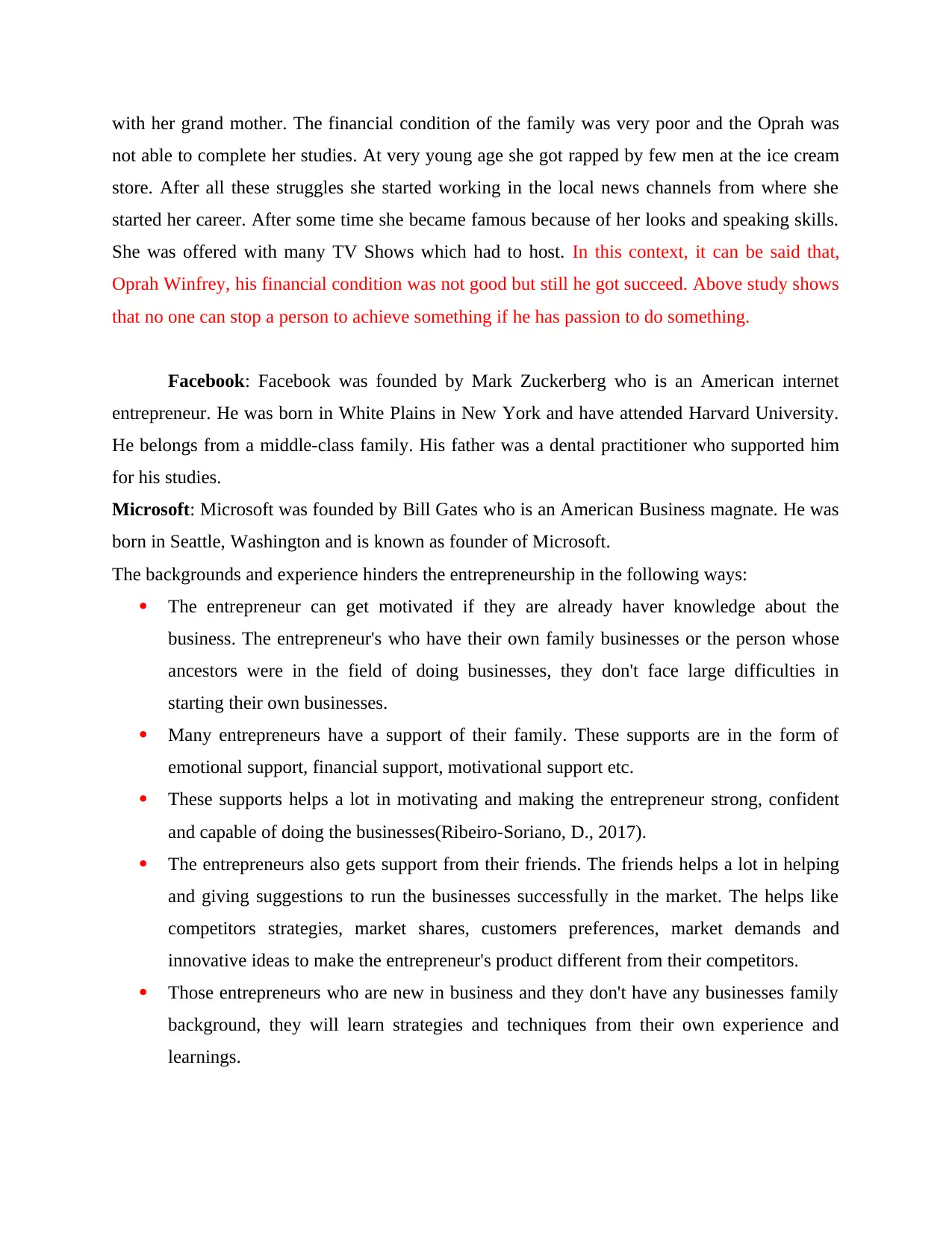
with her grand mother. The financial condition of the family was very poor and the Oprah was
not able to complete her studies. At very young age she got rapped by few men at the ice cream
store. After all these struggles she started working in the local news channels from where she
started her career. After some time she became famous because of her looks and speaking skills.
She was offered with many TV Shows which had to host. In this context, it can be said that,
Oprah Winfrey, his financial condition was not good but still he got succeed. Above study shows
that no one can stop a person to achieve something if he has passion to do something.
Facebook: Facebook was founded by Mark Zuckerberg who is an American internet
entrepreneur. He was born in White Plains in New York and have attended Harvard University.
He belongs from a middle-class family. His father was a dental practitioner who supported him
for his studies.
Microsoft: Microsoft was founded by Bill Gates who is an American Business magnate. He was
born in Seattle, Washington and is known as founder of Microsoft.
The backgrounds and experience hinders the entrepreneurship in the following ways:
The entrepreneur can get motivated if they are already haver knowledge about the
business. The entrepreneur's who have their own family businesses or the person whose
ancestors were in the field of doing businesses, they don't face large difficulties in
starting their own businesses.
Many entrepreneurs have a support of their family. These supports are in the form of
emotional support, financial support, motivational support etc.
These supports helps a lot in motivating and making the entrepreneur strong, confident
and capable of doing the businesses(Ribeiro-Soriano, D., 2017).
The entrepreneurs also gets support from their friends. The friends helps a lot in helping
and giving suggestions to run the businesses successfully in the market. The helps like
competitors strategies, market shares, customers preferences, market demands and
innovative ideas to make the entrepreneur's product different from their competitors.
Those entrepreneurs who are new in business and they don't have any businesses family
background, they will learn strategies and techniques from their own experience and
learnings.
not able to complete her studies. At very young age she got rapped by few men at the ice cream
store. After all these struggles she started working in the local news channels from where she
started her career. After some time she became famous because of her looks and speaking skills.
She was offered with many TV Shows which had to host. In this context, it can be said that,
Oprah Winfrey, his financial condition was not good but still he got succeed. Above study shows
that no one can stop a person to achieve something if he has passion to do something.
Facebook: Facebook was founded by Mark Zuckerberg who is an American internet
entrepreneur. He was born in White Plains in New York and have attended Harvard University.
He belongs from a middle-class family. His father was a dental practitioner who supported him
for his studies.
Microsoft: Microsoft was founded by Bill Gates who is an American Business magnate. He was
born in Seattle, Washington and is known as founder of Microsoft.
The backgrounds and experience hinders the entrepreneurship in the following ways:
The entrepreneur can get motivated if they are already haver knowledge about the
business. The entrepreneur's who have their own family businesses or the person whose
ancestors were in the field of doing businesses, they don't face large difficulties in
starting their own businesses.
Many entrepreneurs have a support of their family. These supports are in the form of
emotional support, financial support, motivational support etc.
These supports helps a lot in motivating and making the entrepreneur strong, confident
and capable of doing the businesses(Ribeiro-Soriano, D., 2017).
The entrepreneurs also gets support from their friends. The friends helps a lot in helping
and giving suggestions to run the businesses successfully in the market. The helps like
competitors strategies, market shares, customers preferences, market demands and
innovative ideas to make the entrepreneur's product different from their competitors.
Those entrepreneurs who are new in business and they don't have any businesses family
background, they will learn strategies and techniques from their own experience and
learnings.
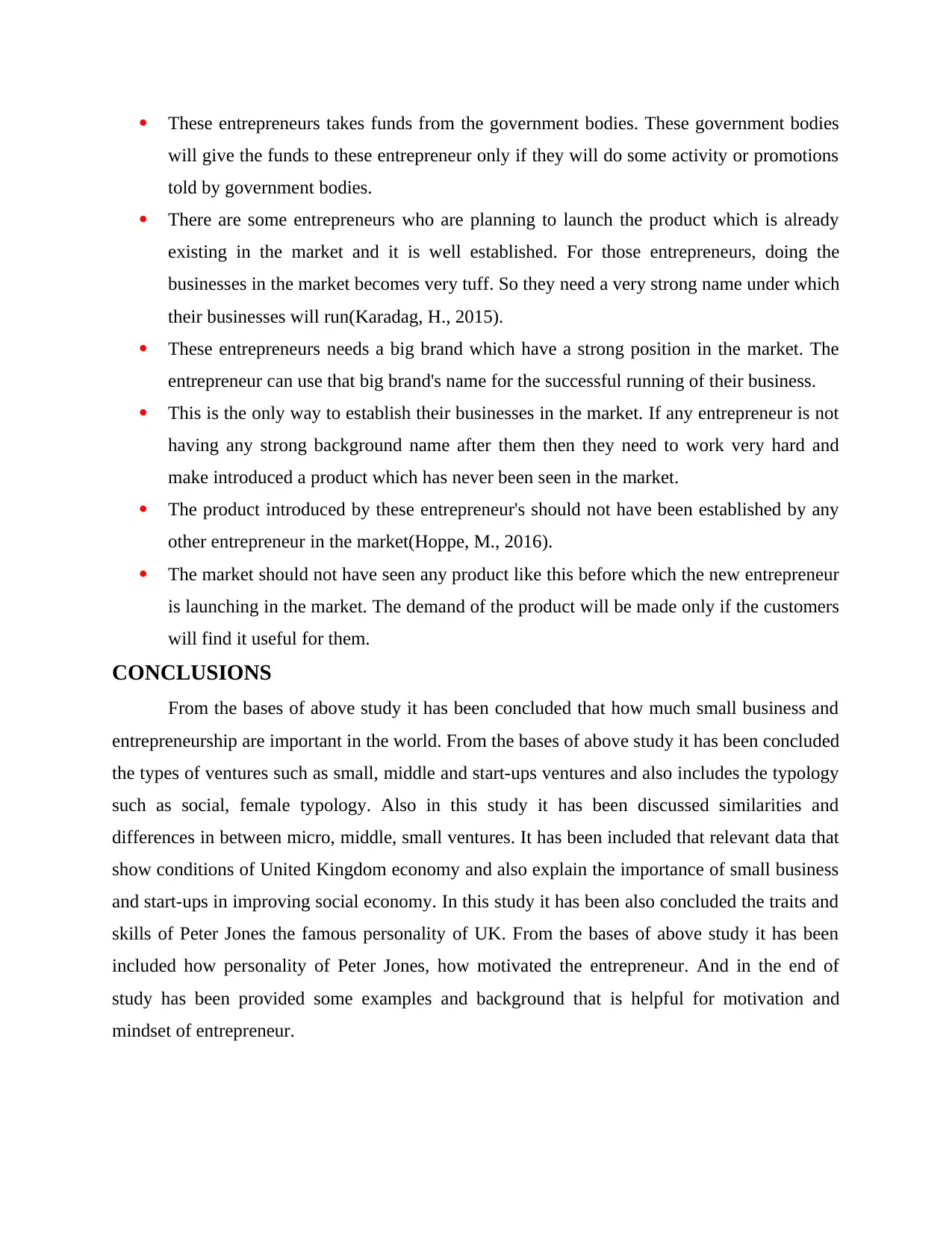
These entrepreneurs takes funds from the government bodies. These government bodies
will give the funds to these entrepreneur only if they will do some activity or promotions
told by government bodies.
There are some entrepreneurs who are planning to launch the product which is already
existing in the market and it is well established. For those entrepreneurs, doing the
businesses in the market becomes very tuff. So they need a very strong name under which
their businesses will run(Karadag, H., 2015).
These entrepreneurs needs a big brand which have a strong position in the market. The
entrepreneur can use that big brand's name for the successful running of their business.
This is the only way to establish their businesses in the market. If any entrepreneur is not
having any strong background name after them then they need to work very hard and
make introduced a product which has never been seen in the market.
The product introduced by these entrepreneur's should not have been established by any
other entrepreneur in the market(Hoppe, M., 2016).
The market should not have seen any product like this before which the new entrepreneur
is launching in the market. The demand of the product will be made only if the customers
will find it useful for them.
CONCLUSIONS
From the bases of above study it has been concluded that how much small business and
entrepreneurship are important in the world. From the bases of above study it has been concluded
the types of ventures such as small, middle and start-ups ventures and also includes the typology
such as social, female typology. Also in this study it has been discussed similarities and
differences in between micro, middle, small ventures. It has been included that relevant data that
show conditions of United Kingdom economy and also explain the importance of small business
and start-ups in improving social economy. In this study it has been also concluded the traits and
skills of Peter Jones the famous personality of UK. From the bases of above study it has been
included how personality of Peter Jones, how motivated the entrepreneur. And in the end of
study has been provided some examples and background that is helpful for motivation and
mindset of entrepreneur.
will give the funds to these entrepreneur only if they will do some activity or promotions
told by government bodies.
There are some entrepreneurs who are planning to launch the product which is already
existing in the market and it is well established. For those entrepreneurs, doing the
businesses in the market becomes very tuff. So they need a very strong name under which
their businesses will run(Karadag, H., 2015).
These entrepreneurs needs a big brand which have a strong position in the market. The
entrepreneur can use that big brand's name for the successful running of their business.
This is the only way to establish their businesses in the market. If any entrepreneur is not
having any strong background name after them then they need to work very hard and
make introduced a product which has never been seen in the market.
The product introduced by these entrepreneur's should not have been established by any
other entrepreneur in the market(Hoppe, M., 2016).
The market should not have seen any product like this before which the new entrepreneur
is launching in the market. The demand of the product will be made only if the customers
will find it useful for them.
CONCLUSIONS
From the bases of above study it has been concluded that how much small business and
entrepreneurship are important in the world. From the bases of above study it has been concluded
the types of ventures such as small, middle and start-ups ventures and also includes the typology
such as social, female typology. Also in this study it has been discussed similarities and
differences in between micro, middle, small ventures. It has been included that relevant data that
show conditions of United Kingdom economy and also explain the importance of small business
and start-ups in improving social economy. In this study it has been also concluded the traits and
skills of Peter Jones the famous personality of UK. From the bases of above study it has been
included how personality of Peter Jones, how motivated the entrepreneur. And in the end of
study has been provided some examples and background that is helpful for motivation and
mindset of entrepreneur.

Paraphrase This Document
Need a fresh take? Get an instant paraphrase of this document with our AI Paraphraser
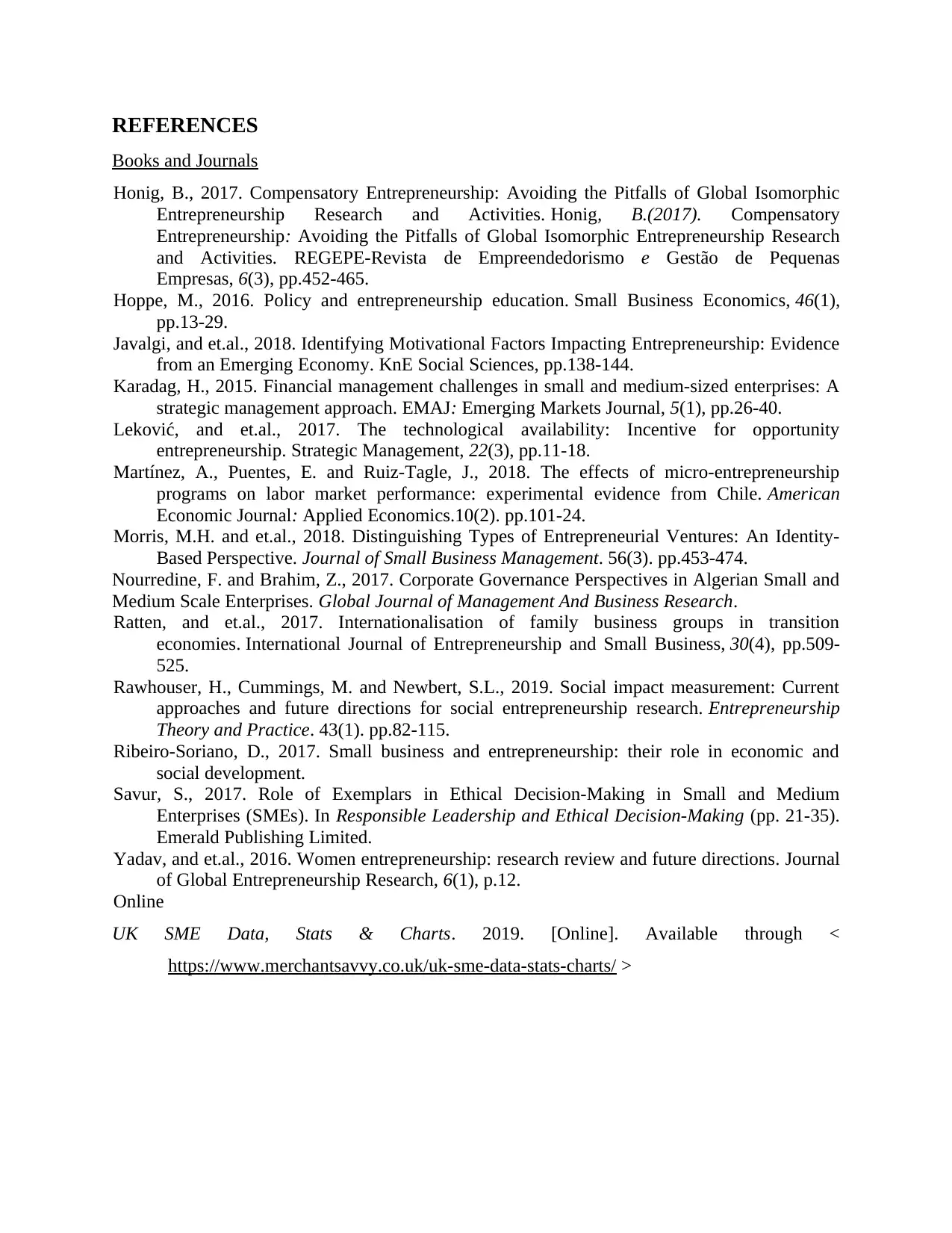
REFERENCES
Books and Journals
Honig, B., 2017. Compensatory Entrepreneurship: Avoiding the Pitfalls of Global Isomorphic
Entrepreneurship Research and Activities. Honig, B.(2017). Compensatory
Entrepreneurship: Avoiding the Pitfalls of Global Isomorphic Entrepreneurship Research
and Activities. REGEPE-Revista de Empreendedorismo e Gestão de Pequenas
Empresas, 6(3), pp.452-465.
Hoppe, M., 2016. Policy and entrepreneurship education. Small Business Economics, 46(1),
pp.13-29.
Javalgi, and et.al., 2018. Identifying Motivational Factors Impacting Entrepreneurship: Evidence
from an Emerging Economy. KnE Social Sciences, pp.138-144.
Karadag, H., 2015. Financial management challenges in small and medium-sized enterprises: A
strategic management approach. EMAJ: Emerging Markets Journal, 5(1), pp.26-40.
Leković, and et.al., 2017. The technological availability: Incentive for opportunity
entrepreneurship. Strategic Management, 22(3), pp.11-18.
Martínez, A., Puentes, E. and Ruiz-Tagle, J., 2018. The effects of micro-entrepreneurship
programs on labor market performance: experimental evidence from Chile. American
Economic Journal: Applied Economics.10(2). pp.101-24.
Morris, M.H. and et.al., 2018. Distinguishing Types of Entrepreneurial Ventures: An Identity‐
Based Perspective. Journal of Small Business Management. 56(3). pp.453-474.
Nourredine, F. and Brahim, Z., 2017. Corporate Governance Perspectives in Algerian Small and
Medium Scale Enterprises. Global Journal of Management And Business Research.
Ratten, and et.al., 2017. Internationalisation of family business groups in transition
economies. International Journal of Entrepreneurship and Small Business, 30(4), pp.509-
525.
Rawhouser, H., Cummings, M. and Newbert, S.L., 2019. Social impact measurement: Current
approaches and future directions for social entrepreneurship research. Entrepreneurship
Theory and Practice. 43(1). pp.82-115.
Ribeiro-Soriano, D., 2017. Small business and entrepreneurship: their role in economic and
social development.
Savur, S., 2017. Role of Exemplars in Ethical Decision-Making in Small and Medium
Enterprises (SMEs). In Responsible Leadership and Ethical Decision-Making (pp. 21-35).
Emerald Publishing Limited.
Yadav, and et.al., 2016. Women entrepreneurship: research review and future directions. Journal
of Global Entrepreneurship Research, 6(1), p.12.
Online
UK SME Data, Stats & Charts. 2019. [Online]. Available through <
https://www.merchantsavvy.co.uk/uk-sme-data-stats-charts/ >
Books and Journals
Honig, B., 2017. Compensatory Entrepreneurship: Avoiding the Pitfalls of Global Isomorphic
Entrepreneurship Research and Activities. Honig, B.(2017). Compensatory
Entrepreneurship: Avoiding the Pitfalls of Global Isomorphic Entrepreneurship Research
and Activities. REGEPE-Revista de Empreendedorismo e Gestão de Pequenas
Empresas, 6(3), pp.452-465.
Hoppe, M., 2016. Policy and entrepreneurship education. Small Business Economics, 46(1),
pp.13-29.
Javalgi, and et.al., 2018. Identifying Motivational Factors Impacting Entrepreneurship: Evidence
from an Emerging Economy. KnE Social Sciences, pp.138-144.
Karadag, H., 2015. Financial management challenges in small and medium-sized enterprises: A
strategic management approach. EMAJ: Emerging Markets Journal, 5(1), pp.26-40.
Leković, and et.al., 2017. The technological availability: Incentive for opportunity
entrepreneurship. Strategic Management, 22(3), pp.11-18.
Martínez, A., Puentes, E. and Ruiz-Tagle, J., 2018. The effects of micro-entrepreneurship
programs on labor market performance: experimental evidence from Chile. American
Economic Journal: Applied Economics.10(2). pp.101-24.
Morris, M.H. and et.al., 2018. Distinguishing Types of Entrepreneurial Ventures: An Identity‐
Based Perspective. Journal of Small Business Management. 56(3). pp.453-474.
Nourredine, F. and Brahim, Z., 2017. Corporate Governance Perspectives in Algerian Small and
Medium Scale Enterprises. Global Journal of Management And Business Research.
Ratten, and et.al., 2017. Internationalisation of family business groups in transition
economies. International Journal of Entrepreneurship and Small Business, 30(4), pp.509-
525.
Rawhouser, H., Cummings, M. and Newbert, S.L., 2019. Social impact measurement: Current
approaches and future directions for social entrepreneurship research. Entrepreneurship
Theory and Practice. 43(1). pp.82-115.
Ribeiro-Soriano, D., 2017. Small business and entrepreneurship: their role in economic and
social development.
Savur, S., 2017. Role of Exemplars in Ethical Decision-Making in Small and Medium
Enterprises (SMEs). In Responsible Leadership and Ethical Decision-Making (pp. 21-35).
Emerald Publishing Limited.
Yadav, and et.al., 2016. Women entrepreneurship: research review and future directions. Journal
of Global Entrepreneurship Research, 6(1), p.12.
Online
UK SME Data, Stats & Charts. 2019. [Online]. Available through <
https://www.merchantsavvy.co.uk/uk-sme-data-stats-charts/ >
1 out of 20
Related Documents
Your All-in-One AI-Powered Toolkit for Academic Success.
+13062052269
info@desklib.com
Available 24*7 on WhatsApp / Email
![[object Object]](/_next/static/media/star-bottom.7253800d.svg)
Unlock your academic potential
© 2024 | Zucol Services PVT LTD | All rights reserved.





